Words at Ease

6 Inspirational Election Speech Examples
Are you preparing to deliver an election speech that will inspire and motivate your audience?
Look no further!

Inspirational Election Speech Examples
We’ve compiled six remarkable examples of election speeches that have captivated listeners and left a lasting impact.
From rousing rallies to heartfelt addresses, these speeches demonstrate the power of words to unite people and ignite change.
In this article, you’ll find speeches of various lengths, each with its unique style and message.
Whether you’re seeking inspiration for a short introduction or a comprehensive campaign address, these examples will provide you with valuable insights and ideas to craft your compelling election speech.
Let’s jump right in!
My fellow citizens, today we stand at a crossroads. Our nation faces challenges that demand bold action and unwavering commitment. I stand before you not merely as a candidate, but as a fellow citizen who shares your hopes, your dreams, and your determination to build a brighter future for ourselves and generations to come.
Together, we have the power to create change. We have the opportunity to forge a path towards prosperity, equality, and justice for all. It is not an easy road, but it is a necessary one. It requires every one of us to rise above our differences, to unite in purpose, and to work tirelessly towards our common goals.
I pledge to you my unwavering dedication to this cause. I will fight for your rights, your opportunities, and your well-being. I will listen to your voices and be your champion in the halls of power. Together, we will build a future that we can be proud of – a future where every child has access to quality education, where every worker earns a living wage, and where every community thrives.
So I ask you today, not just for your vote, but for your partnership. Let us join hands, let us stand shoulder to shoulder, and let us work together to create the change we wish to see. The road ahead may be challenging, but with your support, your trust, and your determination, there is no obstacle we cannot overcome.
Together, we will write the next chapter of our nation’s story – a story of hope, of progress, and of a brighter tomorrow for all. Thank you, and may God bless our great nation.
— END OF SPEECH —
Commentary: This short speech is ideal for a campaign rally or event introduction. It emphasizes unity, shared purpose, and the power of collective action to create positive change. The speaker presents themselves as a champion of the people, ready to fight for their rights and well-being.
Friends, neighbors, and fellow citizens, I stand before you today with a heart full of gratitude and a mind focused on the future. Our community has faced its share of challenges, but through it all, we have remained resilient, united, and steadfast in our commitment to one another.
As I look out at the faces gathered here, I see the very best of who we are. I see hardworking families striving to build a better life for their children. I see small business owners who pour their hearts and souls into their enterprises. I see educators, healthcare workers, and public servants who dedicate their lives to serving others. I see a community that cares deeply about one another, that lifts each other in times of need, and that celebrates together in times of joy.
It is this spirit of community, this unbreakable bond that ties us together, that I want to carry with me as your representative. I believe that government works best when it works hand in hand with the people it serves. When it listens to your concerns, your ideas, and your aspirations. When it fights for your interests and ensures that every voice is heard.
That is the kind of leadership I promise to bring to the table. Leadership that is accountable, transparent, and responsive to the needs of our community. Leadership that brings people together, rather than dividing them. Leadership that focuses on solutions, not just problems.
Together, we can build a future that is worthy of our shared hopes and dreams. A future where every child receives a quality education that prepares them for success. Where every family has access to affordable healthcare and a safe place to call home. Where every worker can earn a living wage and build a secure future for themselves and their loved ones.
These are not just empty promises, but a vision that we can make a reality by working together. By rolling up our sleeves, by reaching across the aisle, and by never losing sight of the common good that unites us all.
So I ask for your support, not just on election day, but every day as we work to build a stronger, more vibrant community. Together, we can create a future that we are proud to leave to our children and grandchildren. A future that honors our history, while boldly embracing the possibilities of tomorrow.
Thank you, and may God bless our community and all who call it home.
Commentary: This medium-length speech is well-suited for a community event or town hall meeting. It emphasizes the importance of community, shared values, and the role of responsive leadership in addressing local concerns. The speaker presents a vision for the future that focuses on quality education, affordable healthcare, safe housing, and economic opportunity for all.
My fellow Americans, we gather here today at a moment of great consequence for our nation. The choices we make in this election will shape the course of our country for generations to come. They will determine whether we move forward together as one people, united in purpose and resolve, or whether we allow ourselves to be divided by the forces of fear, intolerance, and self-interest.
I believe that the true strength of America lies not in the power of our military or the size of our economy, but in the enduring power of our ideals. The notion that all men and women are created equal, that they are endowed by their Creator with certain unalienable rights, and that among these are life, liberty, and the pursuit of happiness.
These are the ideals that have guided our nation through its darkest hours and its greatest triumphs. They are the ideals that inspired generations of Americans to march for civil rights, to stand up for women’s suffrage, and to fight for the dignity and equality of every human being. They are the ideals that must guide us now, as we confront the challenges of our time.
For too long, we have allowed the voices of division and discord to dominate our politics. We have seen the rise of a politics that seeks to pit us against one another, to exploit our differences for political gain, and to sow the seeds of fear and mistrust. But that is not who we are as a nation. That is not the America that I know and love.
The America I know is a nation of courage, compassion, and community. It is a nation where we look out for one another, where we lift each other in times of need, and where we work together to build a better future for all. It is a nation where we celebrate our diversity as a source of strength, not a cause for division. It is a nation where we recognize that our destiny is inextricably linked and that we rise or fall as one people.
That is the America I am fighting for in this election. An America where every child has access to a world-class education, regardless of the zip code they grow up in. An America where every family can afford quality healthcare and no one has to choose between paying for medicine and putting food on the table. An America where every worker earns a living wage and has the opportunity to build a better life for themselves and their families.
To achieve this vision, we must be willing to put aside the petty differences that divide us and come together around our shared values and common interests. We must be willing to listen to one another, to engage in honest and respectful dialogue, and to find common ground wherever we can. We must be willing to stand up to the forces of intolerance and bigotry wherever they rear their ugly heads and to fight for the rights and dignity of every human being.
This will not be an easy task. The challenges we face are great, and the forces arrayed against us are powerful. But I have faith in the American people. I have faith in our resilience, our ingenuity, and our unwavering commitment to the ideals that have made this country great.
Together, we can build a future that is worthy of our highest aspirations. A future where every American has the opportunity to live up to their God-given potential, to pursue their dreams, and to leave a better world for their children. A future where America once again stands as a beacon of hope and opportunity for all who seek it.
So let us go forth from this place, united in purpose and resolve. Let us work together, not as Democrats or Republicans, but as Americans. Let us seize this moment, and let us build a future that we can all be proud of.
Thank you, and may God bless the United States of America.
Commentary: This long speech is appropriate for a major campaign event or rally. It touches on themes of unity, shared values, and the need to overcome division and work together for the common good. The speaker lays out a vision for the future that includes access to education, affordable healthcare, and economic opportunity, while also acknowledging the challenges that must be overcome to achieve these goals.
Friends, tonight I stand before you filled with gratitude, humility, and a profound sense of responsibility. The trust you have placed in me, the faith you have shown in our shared vision, is a sacred honor that I do not take lightly.
This campaign has never been about me. It has always been about us. About the kind of country we want to build together. About the values we cherish and the ideals we hold dear. About the future we want to leave for our children and grandchildren.
Throughout this journey, I have had the privilege of meeting people from all walks of life. I have listened to their stories, shared in their struggles, and been inspired by their resilience and determination.
I have met workers who toil long hours for too little pay, who worry about making ends meet and providing for their families. I have met students burdened by crushing debt, who wonder if they will ever be able to afford a home or start a family of their own. I have met seniors who have worked hard all their lives, only to see their savings wiped out by the rising cost of healthcare.
These are the stories that have shaped my vision for America. A vision of a country where every person has the opportunity to reach their full potential. Where hard work is rewarded with fair wages and good benefits. Where education is a right, not a privilege reserved for the few. Where healthcare is accessible and affordable for all, and where no one has to choose between paying for medicine and putting food on the table.
This is the America we are fighting for. An America that is not divided by race, religion, or political party, but united by our shared hopes and dreams. An America that is not beholden to the special interests or the wealthy few, but responsive to the needs and aspirations of working families.
To build this America, we must be willing to take on the powerful forces that have held us back for too long. The entrenched interests that benefit from the status quo. The politicians who put party over country and self-interest over the common good.
But I know that we are up to the challenge. Because I have seen the strength, the courage, and the determination of the American people. I have seen it in the faces of the workers who have lost their jobs, but never lost their dignity. I have seen it in the eyes of the students who refuse to let their dreams be denied. I have seen it in the hearts of the seniors who have fought for the programs that keep them healthy and secure.
Together, we can build an America that works for everyone. An America where every child has the chance to succeed, regardless of the circumstances of their birth. An America where every worker can earn a living wage and have access to quality, affordable healthcare. An America where every senior can retire with dignity and security, knowing that the promises made to them will be kept.
This is not just a campaign; it is a movement. A movement of people from all walks of life, united by a common purpose and a shared vision. A movement that believes in the promise of America, and the power of the American people to make that promise real.
So let us go forward from this place, united in our resolve and committed to our cause. Let us knock on every door, make every call, and leave no stone unturned in our quest for a better future. Let us build an America that is truly worth fighting for.
An America where every dream is within reach, every voice is heard, and every person is valued. An America that is not just a country, but an idea – an idea that burns bright in the hearts of all who believe in it. That idea is the American Dream, and it is ours to claim, defend, and pass on to the next generation.
Thank you, God bless you, and God bless the United States of America.
Commentary: This lengthy speech is suitable for a major campaign rally or a national convention. It presents a vision for America that emphasizes opportunity, fairness, and unity, while also acknowledging the challenges and powerful interests that must be overcome. The speaker uses personal stories and examples to connect with the audience and make the case for a movement that transcends political divisions.
My fellow citizens, we stand at a pivotal moment in our nation’s history. A moment that calls for bold leadership, creative solutions, and a renewed commitment to the ideals that have made this country great.
For too long, we have allowed the politics of division to dominate our discourse. We have seen the rise of a political system that rewards soundbites over substance, that prioritizes short-term gain over long-term progress, and that pits us against one another rather than bringing us together.
But that is not who we are as a nation. We are a people of courage, compassion, and resilience. A people who have faced countless challenges throughout our history, and who have emerged stronger, wiser, and more united each time.
Today, we face a new set of challenges. A global pandemic that has claimed too many lives and disrupted too many livelihoods. An economy that has left too many workers behind, even as the stock market soars to new heights. A climate crisis that threatens the very future of our planet, and the health and well-being of generations to come.
These challenges are great, but they are not insurmountable. With the right leadership, the right policies, and the right spirit of cooperation and collaboration, we can overcome them. We can build a future that is more just, more equitable, and more sustainable for all.
That is the future I am fighting for in this election. A future where we invest in the potential of every American, regardless of their background or circumstances. A future where we create good-paying jobs in the industries of the future, from clean energy to high-tech manufacturing. A future where we ensure that every child has access to a world-class education, from early childhood through college and beyond.
To achieve this future, we must be willing to think big and act boldly. We must be willing to challenge the status quo and take on the entrenched interests that have held us back for too long. We must be willing to put aside the partisan bickering and work together, across the aisle and across our differences, to find common ground and forge lasting solutions.
This will not be easy. The road ahead will be long and the challenges will be great. But I have faith in the American people. I have faith in our ingenuity, our determination, and our unwavering commitment to the ideals that have guided us throughout our history.
Together, we can build a future that is worthy of our highest aspirations. A future where every American has the opportunity to live up to their full potential, to pursue their dreams, and to leave a better world for their children and grandchildren.
That is the America I believe in. An America that is not defined by our differences, but by our shared hopes and dreams. An America that is not just a country, but an idea – an idea that has inspired generations of people, from all corners of the world, to come here and build a better life.
So let us go forth from this place, united in our resolve and committed to our cause. Let us work together, not as Democrats or Republicans, but as Americans. Let us seize this moment, and let us build a future that we can all be proud of.
Commentary: This lengthy speech is appropriate for a major policy address or a State of the Union-style speech. It acknowledges the challenges facing the nation, from the pandemic to the economy to the climate crisis, while also presenting a hopeful vision for the future. The speaker emphasizes the need for bold leadership, creative solutions, and a spirit of cooperation and collaboration to overcome these challenges and build a more just, equitable, and sustainable future for all Americans.
Friends, family, and fellow citizens – I stand before you today with both a heavy heart and a sense of unwavering determination. This campaign has been a journey of incredible highs and heartbreaking lows. We have celebrated victories and mourned losses. We have faced challenges that seemed insurmountable, yet, here we stand, united and ready to fight for the future of our great nation.
Throughout this journey, I have been inspired by the stories of everyday Americans. The single mother works two jobs to put food on the table and send her children to college. The small business owner who pours their heart and soul into their community, creating jobs and opportunities for their neighbors. The teacher who goes above and beyond to ensure that every child in their classroom has the chance to succeed, no matter their background or circumstances.
These are the stories that have fueled our campaign. These are the people we are fighting for. These are the voices that will guide us as we work to build a better, brighter future for all Americans.
Let me be clear – the road ahead will not be easy. The challenges we face as a nation are great, and the forces arrayed against us are powerful. We will face opposition at every turn, from those who benefit from the status quo, who seek to divide us for their own
gain, and who fear the power of a people united in a common purpose.
But I have faith in the American people. I have faith in our resilience, our determination, and our unbreakable spirit. I have faith that, together, we can overcome any obstacle, face any challenge, and build a future that is worthy of our highest ideals.
So let us go forth from this place, not as Democrats or Republicans, but as Americans. Let us reach across the aisle, across the divide, and find the common ground that unites us. Let us fight for the values we hold dear – justice, equality, and opportunity for all. Let us never forget that, in the end, we are all in this together.
This campaign has never been about one person, one party, or one ideology. It has always been about the American people – our hopes, our dreams, and our shared future. It is in that spirit that I ask for your support, not just on election day, but every day, as we work to build a nation that lives up to the promise of its founding.
A nation where every child can dream big dreams, and know that they have the chance to make them come true. A nation where every worker can earn a fair wage, and build a better life for themselves and their families. A nation where every person, regardless of race, religion, or background, is treated with dignity, respect, and equal justice under the law.
That is the America I believe in. That is the America we are fighting for. That is the America we will build, together, with your help, your hope, and your unwavering commitment to the ideals that have made this country great.
Thank you, God bless you, and may God bless the United States of America.
Commentary: This final speech is a powerful and emotional appeal that would be fitting for the closing argument of a campaign. The speaker draws on the stories of everyday Americans to highlight the challenges facing the nation and the values at stake in the election. They acknowledge the difficulties ahead, but express faith in the resilience and determination of the American people to overcome them. The speech ends with a call for unity and a vision of an America that lives up to its highest ideals of justice, equality, and opportunity for all.
These six inspirational election speech examples demonstrate the power of words to move hearts, minds, and nations.
From short rallying cries to in-depth policy visions, each speech offers a unique perspective on leadership, values, and the hopes and dreams of the American people.
As you write your election speech, remember to speak from the heart, connect with your audience through shared experiences and aspirations, and paint a vivid picture of the future you envision.
With passion, authenticity, and a compelling message, you too can inspire and motivate others to action.
No matter the length or occasion of your speech, the key is to remain true to your principles, your vision, and your commitment to serving the people you seek to represent.
By doing so, you can not only win an election but also help build a better, brighter future for all.
Written Samples
10 student council speech samples.
Running for a position on the Student Council is a commendable endeavor that requires courage, planning, and a clear vision. Student Council serves as the voice of the student body, advocating for changes, planning events, and representing student interests.
A strong, compelling speech can significantly impact your campaign, resonating with peers and motivating them to vote for you. This article provides 10 distinct student council speech samples tailored for various roles and personalities.
Student Council Speech Samples
Whether you’re running for president, vice president, treasurer, secretary, or a specific committee, these speeches are designed to inspire and guide you in crafting your unique message.
Speech 1: The Visionary Leader
“building a brighter future together”.
Fellow students, today marks a significant moment in our journey together. I stand before you, not as an individual, but as a representative of the collective dreams and aspirations we all share for our school. As a candidate for your Student Council President, I am committed to making those dreams a reality.
Our school is more than just a building; it’s a vibrant community where each of us has the opportunity to grow, learn, and succeed. However, like any community, we face our share of challenges. Whether it’s improving school lunches, increasing club funding, or ensuring that every student’s voice is heard, there is always work to be done.
My vision is to create a more inclusive, supportive, and dynamic school environment. This means establishing open forums where every student can voice their concerns, working closely with administration to implement sustainable changes, and building a culture of mutual respect and collaboration.
I bring to this position my experience as class representative, my passion for student involvement, and my unwavering commitment to our school’s welfare. Together, we can build a brighter future for all students. Let’s make it happen!
Speech 2: The Approachable Vice President
“uniting for a stronger community”.
Hello, fellow students! I am thrilled to stand before you as a candidate for Vice President of the Student Council. My goal is clear: to work alongside the president in creating a united, empowered student body ready to tackle the challenges and embrace the opportunities that come our way.
As Vice President, I will focus on enhancing communication between the council and you, the students. I plan to set up a suggestions box, hold regular meet-ups, and ensure your ideas and concerns don’t just stay heard but acted upon. I understand the importance of teamwork, and I promise to be an accessible, friendly face you can always turn to.
My dedication to our school community stems from my own experiences as an active member of several clubs and organizations. These experiences have taught me the value of listening, the importance of action, and the transformative power of community spirit. Let’s work together to make our school not just a place of learning, but a home of lasting memories and achievements!
Speech 3: The Meticulous Treasurer
“investing in our future”.
Good day, students! As a candidate for the position of Treasurer, I want to talk about an essential aspect of our student council: fiscal responsibility. The role of Treasurer is more than just handling funds; it’s about ensuring that every dollar you entrust to the council is spent wisely and benefits as many students as possible.
I come to you with a strong background in mathematics and a keen eye for detail, qualities that are crucial for managing our budget effectively. I plan to introduce transparent budget reports, seek your input on spending priorities, and negotiate for better deals on our events and supplies.
Investing in our future means more than just saving money; it means funding initiatives that build our skills, enhance our school spirit, and create lasting memories. With your trust, I promise to be a responsible steward of our resources, always seeking ways to improve our collective experience while maintaining fiscal prudence.
Speech 4: The Organized Secretary
“keeping us connected”.
Hello, everyone! As your prospective Student Council Secretary, I understand the significance of organization and clear communication in making our council effective. My mission is to keep us connected and informed, ensuring that every meeting, every event, and every decision is recorded and communicated to you promptly and clearly.
My approach involves not just meticulous note-taking and organizing but also harnessing technology to streamline our communication. This means regular updates through our school’s website and social media, creating a digital archive of minutes and decisions, and ensuring you’re always in the loop.
By keeping our council’s work transparent and accessible, I aim to build trust and encourage greater participation from all of you. Let’s work together to create a well-informed student body capable of making a difference!
Speech 5: The Dedicated Committee Member
“every voice matters”.
Hi, everyone! Running for a specific committee might seem like a small role, but it’s roles like these that make our student council function effectively. As a candidate for the [Insert Committee Name] committee, I am passionate about [Insert Committee Focus, e.g., environmental issues, school spirit, academic improvement].
My commitment is to bring fresh ideas, boundless energy, and a listening ear to this position. I want to ensure that every student who shares a passion for [Committee Focus] has a platform to express their ideas and see them come to life. Whether it’s organizing events, leading campaigns, or working on improvements, I am ready to dedicate my time and effort to make a real impact.
Your vote means not just support for me but an investment in the area we’re passionate about. Let’s join hands and make [Insert School Name] a beacon of [Committee Focus] excellence!
Speech 6: The Inspirational President
“leading with heart and vision”.
Dear students, as I stand before you, aspiring to be your next Student Council President, I am filled with a sense of purpose and determination. This school is not just an institution but a vibrant community where each of us has the potential to thrive and contribute. As your president, I aim to lead not just with decisions, but with vision, empathy, and unwavering dedication.
My vision for us is a school where every student feels valued and empowered. A place where we tackle challenges head-on, celebrate our diversity, and work collectively towards innovative solutions. I plan to initiate regular student-led forums, champion inclusive policies, and ensure that our activities and decisions reflect the rich tapestry of our student body.
My commitment to you is rooted in a deep belief in teamwork, respect, and perseverance. I have learned through various leadership roles that the key to effective leadership is listening, adapting, and inspiring. Together, we can elevate our school to new heights, create a nurturing environment, and build a legacy of positivity and progress.
Speech 7: The Dynamic Vice President
“collaboration and action”.
Greetings, fellow students! As candidates for Vice President of the Student Council, I am excited about the prospect of working closely with the president to amplify your voices and bring your ideas to fruition. I understand that this role is pivotal in facilitating smooth operations and fostering a spirit of unity and collaboration among us.
My focus will be on bridging the gap between students and the council, ensuring that we are not just a body making decisions but a dynamic team working in sync with the student community. I plan to introduce innovative collaboration tools and platforms where every suggestion is considered, and every voice is heard.
With my experience in organizing school events and managing teams, I bring a set of skills that are crucial for the effective execution of our shared goals. I promise to be proactive, resourceful, and most importantly, accessible to each one of you. Let’s work together to make our school a hub of vibrant student activity and shared success.
Speech 8: The Strategic Treasurer
“fiscal responsibility, our collective commitment”.
Hello to all! As your candidate for Treasurer, I am aware of the significant responsibility that comes with managing our student council’s finances. It’s not just about keeping books; it’s about strategic planning, transparency, and making every penny count towards improving our school life.
I bring to this position my experience with budgeting and finance, coupled with a deep commitment to serve each one of you. My plan includes introducing a participatory budgeting process where you get to have a say in our financial priorities, regular financial updates to keep everyone informed, and innovative fundraising ideas to boost our resources.
Investing in our collective future means making smart, ethical, and impactful financial decisions. With a keen eye on our goals and a strict adherence to transparency, I will ensure that our council’s financial health is robust and that our resources are aligned with our shared vision.
Speech 9: The Efficient Secretary
“the backbone of our council”.
Dear students, as a hopeful Secretary for our Student Council, I recognize the immense responsibility of being the link between you and the council’s activities. This role is more than just taking minutes; it’s about ensuring that every decision, every event, and every initiative is documented, communicated, and archived effectively.
My vision is to make our council’s workings as transparent and accessible as possible. This means not only meticulous record-keeping but also innovative communication strategies to keep everyone informed and engaged. I plan to utilize digital platforms to disseminate information, organize feedback sessions, and ensure that our council is always accountable to you.
With a commitment to organization and a passion for communication, I am ready to be the reliable backbone of our council, ensuring that as we move forward, every step is recorded, every voice is heard, and every achievement is shared.
Speech 10: The Passionate Committee Leader
“spearheading change, one initiative at a time”.
Greetings, peers! As a candidate for the [Insert Committee Name, e.g., Environmental Committee] leader, I am here not just to lead a committee but to ignite a movement. Whether it’s enhancing our school’s green initiatives, boosting academic resources, or strengthening our sports programs, each committee plays a crucial role in our student council’s mission.
I am passionate about [Committee Focus] and have spent my time at school actively involved in related projects and initiatives. As a leader, I plan to bring this passion to the forefront, driving innovative programs, rallying student support, and ensuring that our activities have a lasting impact.
Your support means empowering a dedicated leader focused on making tangible changes in our school. Together, we can champion causes close to our hearts, bring about meaningful change, and leave a legacy that future students will be proud of.
In crafting your speech, remember the importance of authenticity, clarity, and enthusiasm. Your fellow students are looking for leaders who not only promise but also inspire and enact real change. Use these samples as inspiration, but ensure your personal story and vision shine through. Good luck!
Blog Search
Jan 02, 2020
Stump Speech: The Ultimate Speechwriting Guide
by Martín Diego Garcia
Other Resources show related blog posts
- Political Communication Strategy - Don't Skimp on Speechwriting
- Speechwriting: 7 Questions with Eric Schnure
- Political House Party Dos and Don'ts
- Harnessing Testimonials for Your Ballot Measure Campaign
- 7 Questions with Joshua Kalla on Political Persuasion
- Write a Political Speech

Stump Speech: Connect With Voters by Creating a Campaign Speech.
Here is our ultimate guide to writing a great stump speech. We all know that the candidate is the campaign’s best asset, and the stump speech is the best campaign tool for delivering a 7C’s (clear, concise, contrastive, connective, creative, compelling, consistent) message and personal story about the candidate and campaign.
WHAT IS A STUMP SPEECH? A political Campaign speech has been a staple on the campaign trail since the 1800s and is still a critical tool for modern day campaigns. Your stump speech should be the core message for you campaign and repeated at almost every campaign event or activity. A candidate should be able to repeat their stump speech in their sleep and might just start doing that involuntarily after delivering it a couple of hundred times. The speech should be a quick way for the candidate to answer the following questions for their audience:
- WHO the candidate is? This should be a short introduction of the candidate’s name and a little background to humanize them to voters. Where you’re from, your family, your connection to the community?
- WHY they are running for this office? There should be a very clear and compelling connection between your person story and the collective challenge your community is facing that has prompted you to run for office. Tell a story about the issue(s) you’re running on. Who specifically is being harmed by these problems?
- WHAT is the contrast/choice for voters? This is VERY important. You need to lay out your vision for the future and differentiate it from your opponent(s)’s idea for the future of your community. If there is no clear contrast the voters will not have a compelling reason to cast a vote.
- WHAT is the ask for the audience? Lastly, you need a simple and specific ask for your audience. Do you need them to vote for you? Knock on doors? Donate to your campaign? And by when do you need them to do it?
HOW LONG SHOULD YOUR STUMP SPEECH BE? An average campaign speech given at an event, at the doors, on an interview can be between 5-10 minutes in length. However, most often a candidate has about 90 seconds to 3 minutes when on the campaign trail for an introduction. So be prepared!
Think of the shorter version as a quick introduction like cliff notes or a synopsis. This can be used to start a conversation at the door or introduce yourself on the fly. For the longer version of the speech you are merely adding a little more context and color to the story depending on your audience.
WHAT SHOULD BE IN YOUR STUMP SPEECH? Here are the core campaign speech writing components that should be in your speech. They do NOT need to be in this order necessarily, but the speech should have a nature order that flows together.
- INTRODUCTION: You need to have a hook to grab a person’s (peoples) attention right from the start (be careful with telling jokes unless you’re good at them) and then give the basics – your name and office you’re running for.
- PERSONAL STORY: Weave in your personal story. What is your motivation for stepping up to run for office? What are the values you hold that are needed in the office or to solve this issue? But whatever your do, please DO NOT list off your resume. No one is interested in hearing that. Trust me.
- PROBLEM STATEMENT: Present a clear and relevant (to audience and electorate) issue that needs to be solved. What is wrong that needs to be fixed? (For incumbents, what needs more work OR to be protected?). Why do you care about this issue and why is it relevant to the community at large? What is at stake for them?
- SOLUTION/VISION: What is your solution to solving this program? What skills, experiences or qualities do you have that make you suited to solve this issue? Paint a picture for the audience about what their future could look like if this problem was solved.
- ASK: What is it you need from the audience you’re speaking to? You need a clear and concise call to action that allows them to be part of your vision and get involved with your campaign. Do you need an endorsement? Donations? Volunteers? Votes? Tell them exactly how they can help be part of the solution.
- Thank them for their time!
WHY SHOULD YOU TELL YOUR PERSONAL STORY?
Stories have been a part of civilization since the dawn of time. Stories have been used to pass down history through generations. It is also how we connect with each other through a shared humanity. It’s no wonder we’re all wired to engage with and react to stories that includes voters! Stories are all around us in books, TV, movies, music, news, brunch, literally everywhere. As a candidate you’ll get much farther with your constituents by telling a story to show people your vision versus just throwing facts and data at them.
Utilizing your personal stories can be extremely beneficial due to one thing: it makes you seem normal. One of the issues that America faces today is the lack of care for politics. Candidates who use their personal stories are able to create a positive feeling around their candidacy. Talk about yourself as a way to relate to your audience. Funny stories are great icebreakers. Lastly, and most importantly, always tell the truth. Especially in today’s technological age, it is much easier to find out if a candidate isn’t speaking the truth or is speaking in half-truths.
DO YOU KNOW WHY YOU’RE RUNNING?
Voters want to know why you are running for office. They want to hear your motivation, so they can see if they trust you or not. Voters know what the problems in their communities are, so instead of repeating them back, tell them how they’ve affected you and your community.
For example, if education is your core issues, don’t start by throwing out all the stats and facts about struggling, underfunded schools. Start by showing voters how this is affecting actual people, specifically children, talk about a student who was not able to reach their full potential because of the lack of funding or current policies in place. That way, you’re painting a picture and humanizing the issue for voters, so they see it more personally.
WHY DO YOU NEED TO USE AN EMOTIONAL APPEAL?
People are not rational beings and we often make decisions based on our emotions rather than the facts. If you look at the sweeping victories for Biden, Obama or Trump the one thing that connects them is that they both got voters to feel something. Biden campaign was based on empathy, Obama’s entire campaign was based on hope and aspiration, while Trump’s was based in fear and division. Two very different strategies but both based in telling emotionally captivating narratives.
WHY SHOULD YOU AVOID LISTING OFF YOUR RESUME?
We’ve all been there. Waiting to hear from a candidate and all we get is a rundown of their resume of accomplishment. Spoiler alert: your degrees and awards won’t buy you love from voters. Yes, having them is important but defining yourself by them is not going to create an emotional connection with your audience. Your stump speech should show not tell your story. It should weave in your accomplishments as supporting evidence but not the main plot line.
Remember that every campaign speech will be different, but if you can speak from the heart and tell people your story, they are much more likely to remember you when it comes to casting their vote. So practice, practice, practice and if you need help please feel free to reach out to our team.
Have questions about writing a stump speech? Drop us a note.
Questions? Email Us
- Advocacy & Fundraising Platform
- +234 802 965 5509
- Nonprofits Courses
- Political Campaigns
- Issue-Base Advocacy
- Sign Online Petitions
- Campaign Case Studies
- How To Be a Donor
- Campaign Solutions
- Online Fundraising
- Website Design/Dev.
- Campaign Advertising
- Volunteer Recruitment
- Social Media Advocacy
- Events Planning
- PR & Media Outreach
- Campaign Consulting
- Email Marketing
- SMS/ Text Messaging
- Campaign Call Center
- How It Works
- Sell Products
- Campaign Course
- Campaign Store
- Campaign Events
- Campaign News
- Volunteer Opportunities
- Campaign Guidelines
- Campaign Laws
- Free Resources
- Photo Gallery
- YouTube Videos
- Press Releases
- Testimonials

- By ImpactHub
- Campaign Guidelines , Latest News , Politics Today
How to Write Election Campaign Speech in 10 Steps
This guide provides essential tips on how to write election campaign speech that will resonate with your audience. Writing an election campaign speech is a critical and complex process that requires careful planning, research, and effective communication skills. A campaign speech can make or break a candidate’s chances of success in an election, and thus it must be crafted with the utmost attention to detail and relevance.
A well-crafted speech can help a candidate to connect with voters, build trust, and win support for their candidacy. However, writing a compelling speech that resonates with the audience can be a daunting task. To write an effective election campaign speech, one needs to understand their audience, have a clear campaign message, and convey that message with passion and conviction.
In this process, it is important to keep in mind the tone and style of the speech, the audience’s values and beliefs, and the specific goals of the campaign. Here are useful tips and strategies to help candidates write a successful election campaign speech. Contact us now to help you conduct a thorough research and create an effective political campaign speech that will convey your values and policies of the political party or candidate and resonate with the audience and stakeholders.
Step 1: Define your audience
Before you start writing your campaign speech, you must first define your audience. Who are you speaking to? What are their concerns, hopes, and aspirations? What are the issues that matter to them? By understanding your audience, you can tailor your speech to their needs and concerns and connect with them on a more personal level.
Step 2: Craft a powerful opening
The opening of your speech is crucial, as it sets the tone and captures the attention of your audience. Start with a strong and compelling statement that immediately grabs their attention. You could use a statistic, a quote, or a personal story to draw them in and make them want to listen to what you have to say.
Don’t Miss: How to Develop Campaign Manifesto in 8 Steps
Step 3: focus on your message.
Your campaign speech must have a clear and concise message that reflects your values, beliefs, and vision for the future. Focus on the issues that matter to your audience and demonstrate how your policies and plan of actions will address their concerns. Be specific and provide examples of how you will make a difference if elected as a president, house of representative, senator, governor or even state assembly member.
Step 4: Use persuasive language
The language you use in your speech is essential in persuading your audience to vote for you. Use persuasive language that appeals to their emotions, values, and aspirations. Use simple and easy-to-understand language that everyone can relate to. Avoid using jargon, technical terms, or complex sentences that may confuse or alienate your audience.
Step 5: Be authentic and genuine
Authenticity and genuineness are crucial when delivering a campaign speech. You must be honest and sincere in your message and connect with your audience on a personal level. Share your personal experiences, past records, values, and beliefs that demonstrate your authenticity and inspire trust and confidence in your leadership.
Step 6: Use humor and storytelling
Humor and storytelling are excellent tools for engaging your audience and keeping their attention. Use anecdotes, personal stories, or jokes to add some lightness and humor to your speech. However, be careful not to offend or belittle anyone, as this could harm your credibility and reputation.
You May Like: Impacts of Personality Politics in Nigeria
Step 7: use rhetorical devices.
Rhetorical devices, such as repetition, alliteration, and metaphors, can make your speech more memorable and impactful. Use these devices strategically to emphasize your message and create a lasting impression on your audience.
Step 8: Address your opponent’s weaknesses
When writing a campaign speech, it’s essential to address your opponent’s weaknesses without attacking or insulting them. Highlight your opponent’s weaknesses, and demonstrate how your policies and plans are superior to theirs. However, be respectful and avoid personal attacks or mudslinging, as this could harm your reputation and credibility.
Step 9: End with a call to action
The conclusion of your campaign speech should inspire your audience to take action and vote for you. End your political campaign speech with a powerful call to action that encourages people to support your campaign, volunteer, or donate to your cause. Provide specific instructions on how they can get involved in your movement and make a difference.
Read: The Roles of the Media in Nigerian Elections
Step 10: practice and rehearse.
Finally, practice your speech as much as possible before delivering it to your audience. Rehearse in front of a mirror, record yourself, or practice in front of a friend or family member. This will help you identify areas that need improvement, work on your delivery skills, and build your confidence.
Wrapping up: How to Write Election Campaign Speech
In conclusion, writing an election campaign speech can be a challenging task, but with the right approach and preparation, anyone can deliver a compelling and impactful speech. The first step is to understand the audience and their needs and concerns. This helps to craft a message that resonates with them and addresses their issues.
It is also important to have a clear and concise structure for the speech, with a powerful opening that captures the audience’s attention, a strong middle that reinforces the main points, and a memorable closing that leaves a lasting impression.
Related: How To Hire A Political Campaign Team
To make the speech more persuasive, using rhetorical devices such as repetition, analogy, and emotional appeal can be effective. However, it is important to ensure that the speech is based on accurate and verifiable facts and not just rhetoric. Rehearsing the speech several times before the actual delivery can help to boost confidence and ensure a smooth delivery.
It is also important to get feedback from others and make necessary adjustments to the speech based on their feedback. By following these tips and putting in the necessary effort and practice, you can write and deliver a winning campaign speech.
Related posts:

Leave A Comment
Signup to enjoy access.
Forgot Password
Support a progressive cause or campaign.
By creating an account, you agree to our Terms and Conditions
How To Write A Political Speech

11 min read

Crafting a compelling political speech holds immense importance for any aspiring politician and successful political campaign. It is a powerful tool for connecting with the audience, influencing opinions, and igniting action. To make speeches truly impactful, harnessing the power of voter engagement and direct sourcing is key. Politicians can gather valuable insights directly from the people they aim to represent by actively engaging with voters and listening to their concerns.
This approach adds significant value to speeches and establishes an authentic connection with voters. This blog post will explore the significance of delivering compelling political speeches and highlight the benefits of incorporating voter engagement and direct sourcing techniques. By the end, you'll gain practical insights into creating lessons that resonate with your audience and make a lasting impact. Revise your political speechwriting skills with valuable tips and actionable strategies!
Writing a compelling political speech that resonates with your audience is vital for any politician. Two key factors are crucial to achieving this: defining your objectives and knowing your target audience.
- Defining the objectives: Your speech should have a clear purpose, whether it is to persuade, inspire, or educate your listeners. You can shape your address by defining your goals to achieve those desired outcomes effectively.
- Knowing your target audience: Understanding your audience's demographics, concerns, and aspirations is fundamental. This knowledge allows you to tailor your message in a way that connects with them on a personal level. You can create a speech that resonates deeply and captures their attention by addressing their needs and desires.
Research and Preparation
Research and preparation are vital steps in writing an impactful political speech. By gathering comprehensive data from various sources, conducting surveys, and analyzing voter demographics, you can enhance the effectiveness of your address. Here are key actions to take:
- Collecting data from various sources: Traditional media such as newspapers, TV, and radio provide insights into current political events and public sentiment. Social media platforms like Twitter, Facebook, and YouTube offer information on trending topics and public discourse. Online forums and communities like Reddit, Quora, and specialized political forums allow you to tap into discussions and understand different perspectives.
- Conducting surveys and opinion polls: Engaging in surveys and opinion polls helps you gauge your target audience's opinions, preferences, and concerns. This data provides valuable insights to shape your speech accordingly.
- Analyzing voter demographics and specific concerns: Understanding your audience's demographics, including age, gender, and location, enables you to tailor your speech to resonate with their unique backgrounds and experiences. Additionally, identifying specific concerns and issues that matter to voters allows you to address them directly in your speech, making it more relevant and impactful.
By undertaking thorough research and preparation, you will have a solid foundation for crafting a compelling political speech that speaks directly to your audience's needs and aspirations. In the upcoming sections, we will explore these topics in more detail, providing you with practical strategies to integrate the collected data effectively into your speechwriting process. Get ready to take your political speechwriting skills to the next level!
Crafting a Compelling Political Speech
Crafting a powerful political speech requires careful consideration of the message you want to convey. Here are key steps to help you create a compelling address:
- Identifying key issues and topics: Start by identifying crucial issues such as the economy and jobs, healthcare and social welfare, education and student debt, climate change and environmental policies, and national security and foreign affairs. These topics are often at the forefront of public discourse and resonate with voters.
- Prioritizing topics based on voter feedback and relevance: Listen to the feedback and concerns of voters through surveys, town hall meetings, and direct engagement. Prioritize the topics that resonate most with your audience, ensuring your speech addresses their pressing issues.
- Developing a compelling narrative: Structure your speech with a clear introduction, body, and conclusion to provide a cohesive flow. Utilize storytelling techniques to make your message engaging and relatable, capturing your audience's attention. Connect your experiences to policy proposals, humanizing your speech and showing your understanding of real-life impacts. Emphasize empathy and relatability to establish a genuine connection with your audience, showcasing that you understand and share their concerns.
Following these steps, you can craft a persuasive political speech highlighting key issues, resonating with voters, and inspiring action. In the following sections, we will delve deeper into each aspect, providing you with practical tips and techniques to enhance the impact of your speech. Prepare to deliver a memorable and influential address that leaves a lasting impression!
Rehearsing your political speech is a critical step that significantly aids your confidence and overall delivery. Here are some valuable tips to consider when it comes to rehearsing:
- Practice makes perfect: Dedicate ample time to rehearsing your speech before presenting it to an audience. Aim to rehearse your address at least five times to familiarize yourself with the content, structure, and flow.
- Seek feedback from your team: Once you've practiced independently, deliver your speech to your team and invite their constructive criticism. Their feedback can provide valuable insights and help you refine your points, delivery, and overall performance.
- Conduct a full dress rehearsal: Organize a complete dress rehearsal with your team, where they play the roles of a moderator and your competition. This simulation allows you to identify potential weaknesses in your arguments, anticipate challenging questions, and fine-tune your delivery.
- Capture and review your performance: Consider filming yourself giving the speech during rehearsal. Watching the recording afterwards lets you objectively evaluate your performance, body language, and speaking style. Take note of areas where improvements can be made and make adjustments accordingly.
- Ensure accessibility through simplicity: While rehearsing, approach your speech from the perspective of someone unfamiliar with the topics you're addressing. Use simple language and many analogies to make your political speech accessible to many listeners. This approach enhances understanding and enables your message to resonate with the entire electorate.
By incorporating rehearsal into your speechwriting process, you can boost your confidence, identify areas for improvement, and deliver a polished and impactful speech. Remember, rehearsing allows you to refine your points, connect with your audience effectively, and ensure your message is conveyed clearly, concisely, and relatable.
Use Common Language
Using common language in political speech writing is essential to effectively connect with your audience and ensure your message resonates with a wide range of listeners. Here are key considerations when it comes to using common language:
- Speak in an accessible manner: Communicate in a way that is easily understandable to all. Avoid excessive jargon, complex terminology, or convoluted sentences that may confuse or alienate your audience. Use clear and concise language that allows anyone to grasp your message.
- Avoid offensive terms: Maintaining a respectful and inclusive tone during your speech is important. Steer clear of profane or derogatory language that could offend or marginalize certain groups. Treat your audience with respect, emphasizing unity and understanding.
- Harness the power of stories and personal accounts: Stories and first-person narratives profoundly impact your audience. Utilize relatable anecdotes and real-life experiences to illustrate your points, making your arguments more engaging, relatable, and emotionally compelling.
- Balance simplicity with depth: While most of your content should be easily understandable by anyone, it is acceptable to incorporate academic research, quotations, or statistics that may require additional explanation. Find a balance between simplicity and depth, ensuring that even complex ideas can be grasped by your listeners with the appropriate context and explanation.
Using common language can effectively bridge the gap between complex ideas and the understanding of your audience. Remember, the goal is to connect with as many people as possible, making your message accessible, relatable, and impactful. So, craft your speech with clarity and simplicity while utilizing stories and personal accounts to create an emotional connection that resonates with your listeners.
How to Construct An Argument
Constructing a compelling argument is crucial to writing a persuasive political speech. Here's a step-by-step guide to help you build a strong and impactful argument:
- Clearly state your thesis: Begin by articulating your main point or thesis statement. This sets the foundation for your argument and provides a clear focus for your speech.
- Gather supporting evidence: Collect relevant facts, statistics, expert opinions, and real-life examples that support your thesis. Strong evidence adds credibility and strengthens your argument.
- Organize your points logically: Structure your argument logically and coherently. Present your facts in a sequence that builds upon each other, leading your audience towards your main thesis.
- Anticipate counterarguments: Consider potential counterarguments to your position and address them proactively. This demonstrates thoroughness and strengthens your overall argument.
- Use persuasive language: Choose words and phrases that are persuasive and compelling. Craft your message to resonate with your audience emotionally and intellectually.
- Appeal to logic and emotions: Blend logical reasoning with emotional appeals to make your argument more persuasive. Use rational evidence to support your claims and evoke emotions to connect with your audience more deeply.
- Use rhetorical devices: Employ rhetorical devices such as repetition, analogy, and rhetorical questions to enhance the impact of your argument and make it more memorable.
- Summarize and restate your main points: Conclude your argument by summarizing your main points and restating your thesis. Leave your audience clearly understanding your position and a compelling call to action.
These steps can construct a strong and persuasive argument in your political speech. Remember to support your claims with evidence, organize your points effectively, and appeal to logic and emotions. With a well-constructed argument, your address will be poised to influence opinions and inspire action.
Voter Engagement for your Speech
Engaging with voters through various tactics is essential to crafting a compelling political speech. Here's why it matters and how you can make the most of it:
importance of voter contact tactics:
- Door-to-door canvassing allows you to connect with voters on a personal level, fostering trust and building rapport.
- Town hall meetings provide a platform for open dialogue, enabling you to directly understand local issues and concerns of the community.
- Phone calls and text messages offer an opportunity to engage voters individually, creating a sense of importance and personal connection.
Benefits of engaging voters directly:
- Building trust and rapport strengthens your relationship with voters, making your message more impactful and memorable.
- Understanding local issues and concerns firsthand helps you address them effectively in your speech, showing your commitment to representing the community's needs.
- Obtaining firsthand stories and anecdotes allows you to humanize your speech, adding authenticity and relatability to your message.
Techniques for effective voter engagement:
- Active listening and showing empathy demonstrate your genuine interest in understanding voters' perspectives and concerns.
- Asking open-ended questions encourages voters to share their thoughts and experiences, providing valuable insights for shaping your speech.
- Encouraging voter participation in the speechwriting process empowers them. It ensures their voices are heard, enhancing the authenticity of your speech.
- Utilizing social media platforms to solicit input and feedback broadens your reach. It allows you to engage with a wider audience, gathering diverse perspectives and ideas.
By actively engaging voters through canvassing and other community outreach , you gain invaluable insights, stories, and anecdotes that can greatly enrich your political speech. In the upcoming sections, we will delve deeper into these techniques, providing you with practical strategies to maximize voter engagement and create lessons that truly resonate with your audience. Get ready to harness the power of direct sourcing and make a meaningful impact with your speech!
Incorporating voter input into your speechwriting process is a powerful way to create speeches that truly resonate with your audience. Here's how you can leverage voter input, with a special emphasis on the significance of canvassing:
- Analyzing and categorizing voter stories and concerns: By carefully listening to voters' stories and concerns gathered through canvassing, town hall meetings, and other engagement tactics, you can analyze and categorize them to identify common threads and key issues.
- Identifying common themes and patterns: By recognizing recurring themes and patterns in voter input, you gain insights into your constituency's collective concerns and aspirations. This knowledge allows you to address them effectively in your speech.
- Integrating voter anecdotes into the speech: Personalizing the message by incorporating specific anecdotes and stories voters share, you personalize your speech, making it relatable and impactful. Highlighting real-life impacts: Sharing how specific policies or decisions affect real people helps create a deeper understanding and empathy among your audience.
- Acknowledging and addressing dissenting viewpoints: While incorporating voter input, it's important to acknowledge and address dissenting views. By respectfully engaging with opposing perspectives, you demonstrate inclusivity and a willingness to consider all voices.
By actively involving voters in the speechwriting process, you ensure their concerns and experiences are reflected in your message. This adds authenticity and relatability and strengthens your connection with your audience. In the subsequent sections, we will delve deeper into these strategies, providing you with practical tips to seamlessly integrate voter input into your political speeches. Get ready to create addresses that truly resonate and engage your audience profoundly!
The Ten Minutes Beforehand
The ten minutes beforehand hold significant value in maximizing the impact of your political speech. Here's how you can make the most of this crucial time, offering practical strategies to enhance your performance and connect with your audience:
Center yourself through mindfulness techniques:
- Take deep breaths to calm your nerves and center your mind.
- Practice mindfulness or meditation to focus your thoughts and promote a sense of presence.
Review your key talking points:
- Take a moment to mentally review the main points and messages you want to convey.
- Ensure that your speech aligns with your objectives and resonates with your audience.
Visualize success:
- Visualize yourself delivering a powerful and impactful speech with confidence and clarity.
- Envision a positive response from your audience, creating a sense of belief and determination.
Positive self-talk:
- Engage in positive self-talk to boost your confidence and banish self-doubt.
- Remind yourself of your strengths, expertise, and message value.
Establish a connection with your audience:
- Scan the room and make eye contact with individuals in the audience.
- This brief interaction establishes an initial connection and helps you establish rapport.
Review technical aspects:
- Double-check any specialized equipment or visual aids to ensure they are functioning properly.
- Familiarize yourself with the stage setup and microphone placement for seamless delivery.
Warm up your voice and body:
- Perform vocal warm-up exercises to ensure clarity and projection in your speech.
- Engage in gentle stretches or movements to release tension and promote a relaxed body language.
By utilizing these strategies ten minutes beforehand, you can optimize your mindset, refine your delivery, and establish an immediate connection with your audience. Remember that these moments set the stage for a memorable speech, allowing you to effectively convey your message, inspire your audience, and leave a lasting impact.
Engaging voters through direct sourcing, especially through canvassing, holds immense power in creating impactful political speeches. By incorporating voter input, speeches can exude authenticity and relatability, connecting with the concerns and aspirations of the electorate. This approach inspires trust and establishes a strong connection between politicians and the people they aim to represent. Crafting well-articulated speeches that resonate with voters is a transformative way to influence opinions and ignite action. As you refine your speech writing skills, remember the significance of actively engaging voters, listening to their stories, and addressing their concerns. By doing so, you will deliver speeches that make a lasting impact, inspire change, and foster a deeper connection with your audience.
Get your free 7-day trial of Ecanvasser
How to win a political election...anywhere in the world.
Discover the top strategies used by winning campaigns
Sign up now to have our campaign consultants guide you through your 7-day trial
You may also be interested in

Calculate How Many Votes You Need To Win Your Election

A Guide to the Essential Political Campaign Tools
Copyright © 2023 Ecanvasser - All rights reserved.

What’s a Rich Text element?
The rich text element allows you to create and format headings, paragraphs, blockquotes, images, and video all in one place instead of having to add and format them individually. Just double-click and easily create content.
Static and dynamic content editing
A rich text element can be used with static or dynamic content. for static content, just drop it into any page and begin editing. for dynamic content, add a rich text field to any collection and then connect a rich text element to that field in the settings panel. voila.
How to customize formatting for each rich text
Headings, paragraphs, blockquotes, figures, images, and figure captions can all be styled after a class is added to the rich text element using the "When inside of" nested selector system.
Read more articles.
.jpg)
New Product Update: Smarter Field Mapping
.jpg)
Introducing Custom Reports and Dashboards to Boost Team Productivity
Let's inspire your inbox.
Listening to our current users, we are aware that there can be an internal struggle of team management when it comes to.

Political Campaign And Stump Speech Examples Reveal The Candidate

Candidates for political office make stump or campaign speeches to help voters learn about themselves and their positions throughout the campaign. Here are some examples of political campaign and stump speeches.
In the dynamic world of politics, one powerful tool remains a constant in winning over voters’ hearts and minds: the stump speech. This iconic oratory tradition has shaped countless political campaigns, delivering a potent blend of charisma, policy promises, and persuasive rhetoric.
From fiery appeals for change to heartfelt tales of personal struggles, stump speeches have become the backbone of political communication.
This article explores compelling examples of stump speeches throughout history, unveiling their enduring impact on electoral campaigns and their crucial role in shaping the political landscape.
Table of Contents
What Is A Stump Speech In A Political Campaign?
A stump speech is a standard, rehearsed speech a political candidate delivers during their campaign. It typically outlines the candidate’s core message, policy positions, and personal background, aiming to connect with voters, inspire support, and differentiate themselves from opponents.
A stump speech is essentially an elevator speech where the candidate makes a pitch to constituents.

How Does A Stump Speech Vary From A Campaign Speech?
While a campaign speech is a broader, more comprehensive address covering various topics and contexts, a stump speech is specifically tailored to connect with local audiences during campaign stops.
A stump speech focuses on key themes, repeated consistently across different locations, with an emphasis on connecting personally with voters, conveying authenticity, and generating enthusiasm for the candidate’s platform.
What Should A Politician Say About Themselves?
Politicians should highlight their relevant qualifications, experience, and achievements when speaking about themselves , demonstrating their ability to address the issues. They should also convey their personal values, integrity, and dedication to public service, establishing trust and credibility with the electorate.
How Do You Start Off A Campaign Speech?
“Ladies and gentlemen, distinguished guests, and fellow citizens, I stand before you today with a deep sense of gratitude and determination to embark on a journey together toward a brighter future for our community.
“Thank you all for gathering here today as we embark on a transformative campaign to shape a better tomorrow for our beloved community. With your support and collective efforts, we can build an inclusive, prosperous future filled with opportunities for all.”
What Should You Say In A Campaign Speech?
In a campaign speech, it is crucial to articulate your vision, share specific policy proposals, and address the concerns and aspirations of your constituents. Highlight your experience, values, and dedication to serve while emphasizing the need for unity, progress, and collaborative solutions to tackle the challenges our community faces.
Here is an excerpt:
“In this campaign, we must address the pressing issues affecting our constituents daily, such as education, healthcare, and economic stability, while fostering unity and collaboration to create a stronger, more resilient community for generations to come.
Together, we can bring about meaningful change, empower our citizens, and build a brighter future that reflects the hopes and dreams of each and every one of us.”

How Long Should A Campaign Speech Be?
A campaign speech should be concise and focused, aiming for around 5 to 10 minutes, allowing you to effectively communicate your message while maintaining the audience’s attention and engagement. Remember, it is crucial to prioritize quality content over excessive length to make a lasting impact on your listeners.
What Should You Do After Finishing A Stump Speech?
After delivering a stump speech, engaging with the audience is essential, and you must also show genuine interest in their concerns and feedback. Take the opportunity to connect with individuals, answer questions, and build relationships to establish trust and support for your campaign.
What Should Be Said In The Conclusion Of A Stump Speech?
In the conclusion of a stump speech, it is crucial to summarize your main points and reiterate your core message, leaving a lasting impression on your audience. You can also end the address by inspiring and rallying your supporters, calling them to action, and emphasizing how important their involvement is to the campaign.
Different ways to end a stump speech can include:
- Call to action: Encourage your audience to get involved, vote, volunteer, or contribute to your campaign, emphasizing the collective power of their actions.
- A personal story or anecdote: Share a heartfelt story your audience can connect with on an emotional level, reinforcing your commitment to their concerns and aspirations.
- Inspiring quote: Close your speech with a memorable and inspiring quote that encapsulates your campaign’s values or captures the essence of your message.
- Vision for the future: Paint a vivid picture of the future you envision for your community, highlighting the positive impact your campaign can make and leaving your audience hopeful and motivated.
The best way to end a campaign speech ultimately depends on your personal style, the context, and the specific objectives of your campaign. Consider what resonates most with your audience and aligns with your campaign’s tone and goals.
Stump Speech Examples That Define Candidates

These nine stump speeches are notable for their ability to connect with audiences, convey a powerful message, and leave a lasting impact on listeners:
- Barack Obama’s 2008 “Yes We Can” speech as presidential candidate became iconic, inspiring hope and calling for change. Ex-President Obama’s message of unity and progress resonated with millions of Americans.
- Martin Luther King Jr.’s history 1963 “I Have a Dream” speech during the March on Washington advocated for racial equality and justice for African Americans. His powerful words continue to inspire generations.
- Delivered during World War II, Winston Churchill’s “We Shall Fight on the Beaches” speech rallied the British people and affirmed their determination to resist Nazi aggression, symbolizing their resolve and resilience.
- Elizabeth Warren’s speeches on income inequality and economic fairness, such as her 2012 speech at the Democratic National Convention , have gained attention for advocating for a more equitable society.
- One of Donald Trump’s most notable stump speeches was the one delivered at the Republican National Convention in July 2016, where he formally accepted the party’s nomination for running for president. This speech emphasized his platform on immigration, national security, and job creation while highlighting his outsider status and promising to “Make America Great Again.” It resonated with many of his supporters and helped solidify his message during the campaign.
- One of Joe Biden’s most memorable speeches was his address in Pittsburgh, Pennsylvania, in August 2020. In this speech, Biden presented his economic recovery plan, emphasizing the need for unity, addressing systemic racism, and rebuilding the economy in the wake of the COVID-19 pandemic. He focused on his vision for “ Build Back Better” and stressed the importance of creating jobs, supporting working families, and tackling the climate crisis.
- A notable Hillary Clinton speech was her address at the Democratic National Convention in July 2016. In this speech, Clinton accepted the Democratic Party’s nomination for president and focused on themes of unity, inclusivity, and progress. She discussed her policy proposals, highlighted her experience and qualifications, and called for the American people “to come together to address the challenges facing the nation.”
- Ronald Reagan’s “A Time for Choosing” speech is often regarded as one of the most impactful political speeches in American history and played a significant role in shaping his political career and eventually leading to his own presidency in 1981. Reagan delivered this speech supporting Barry Goldwater’s presidential campaign on October 27, 1964, just days before the U.S. presidential election.
- Abraham Lincoln’s most famous stump speech was his Cooper Union Address, delivered on February 27, 1860, in New York City. The speech primarily focused on the issue of slavery and its expansion, but Lincoln also touched upon foreign policy concerns. In the Cooper Union Address, Lincoln argued against the spread of slavery into new territories, emphasizing its moral and constitutional implications.
Adam Howarth
Adam covers the topic of Public Speaking for Digital Authority. From his first experience of oratory with his school debating society to his more recent experiences of promoting the local business scene in Wrexham, Wales, he has always been involved in public speaking.
Recent Posts
Active Listening Absorbs The Whole Message, Not Just The Words
Active listening goes beyond hearing the words someone is saying to you and understanding the message they are conveying. Many only hear a small percentage of what is being said as they are...
Counteracting Fear Of Public Speaking With Coaching And Therapy
Nearly 75% of people experience the social phobia of fear of public speaking. The result may be nervousness before speaking or a full-blown panic attack. Practicing public speaking may lessen the...
Student Council Speech Ideas & Tips to Help You Win
Whether you want to be president or head up PR, we've got you covered with tips and example student council speeches.
Lori personal and professional experiences have helped her cultivate a broad writing portfolio, spanning publications on subjects like education and parenting.
Learn about our Editorial Policy .
Kate is an experienced writer who has written hundreds of articles for publication.
Getting involved in student council is an amazing way to have a little extra influence in your school, but you have to win an election to get that influence. If you want to convince people to vote for you, you'll need a great student council speech that they'll remember on election day.
Serving on your school's student council gives you a say in student activities and a voice with the school administration, and that's a pretty big deal. It also looks good on college applications. However, to make it onto the student council, you'll first need to give a speech and gather votes from the other students. We've got you covered with writing tips, examples, and ideas to give you tons of extra confidence (and hopefully that win you want).
Winning Student Council Speech Ideas
You've probably done a little (or a lot) of persuasive writing in your classes, and you can totally build on that to write a great speech. You'll also want to make your speech memorable and fun to listen to since you need these kids to think of you when it's time to vote.
- Funny Student Council Speech Ideas to Help Everyone Relate to You
- Tips for a Winning Student Council Speech for Treasurer
- Self-Introduction Speech Examples & Tips to Help You Be Confident & Calm
Use these suggestions to help you craft a speech they'll never forget. It's important that you make sure your speech suits your school and position.
Open With a Humorous Story
Start your speech with something that will make everyone laugh . That can be a joke or a hilarious anecdote — there are no wrong answers as long as you amuse people and don't offend them.
- Funny Intro Ideas for Student Council Speeches
Tell What You've Done Already
Next, you need to establish your credibility. Why should people vote for you? Why are you awesome at this role already? Show off your leadership experience and your connections to people in the school or community.
Explain the Role You're Running For
At this point in the speech, you want to clearly state what you want people to do. Tell them what student council role you're hoping to get and that you will do well in this position.
Keep your speech short and to the point and be honest about why you'd like the position regardless of whether it's a big or smaller role. For smaller roles, such as sergeant-at-arms, auditors, or public relations, hone in on what qualifications you have and use vivid examples to keep your audience interested.
Clearly Ask for Their Vote
Finally, you need to make sure you clearly ask people to vote for you. Mention the election day specifically. It's also nice if you offer to answer any questions or chat with people one-on-one.
Make Your Student Council Speech Stand Out
While there are certain traits and promises the student body expects from every candidate's speech, they want to choose one person who stands out from the crowd. Even if you're running for a smaller position, such as a PR officer or sergeant-at-arms, you may need to make a great speech as well in order to get elected. Make your speech the most memorable one in the room.
- Grab a thesaurus and look for synonyms of common words used to describe the position you're running for. When all the other secretarial candidates talk about their attention to detail, you can use words like "meticulous" or "assiduous" to sound different.
- Include visuals like props, a themed outfit, or specific hand gestures to give your speech a multidimensional feel.
- Choose a speech theme to structure your presentation like a specific social media platform, a historical event, or a particular sport. Look for a theme that relates well to the role you want.
- Invent a catchphrase that captures the spirit of your speech to keep the student body talking about it all the way to the polls.
- Add sound effects, song lyrics, or music to give the speech more life.
Student Council Speech Examples for Each Role
Get inspired to write the perfect speech with these examples for each major role. Whether you're hoping to be president or secretary, these samples can help you get started writing your own speech.
Sample Speech for President
Hello, my name is John Doe and I'm a junior. I'm not the type of student who will lead a senior prank or skip class with you, but that probably isn't what you want in a class president anyway. What I do offer is steadfastness, hard work, and the ability to work with others even during difficult circumstances while still keeping a sense of humor.
Last year, when the cafeteria stopped serving the salad bar, I was able to get it reinstated by starting a petition, having many of you sign it, and taking it to Principal Smith. Because we worked together, we were able to bring the salad bar back, and now it's better than ever.
During the last three years at Sample High School, I've been involved in many activities. I've played basketball, spent a short time in the school band, worked on various committees, and helped tutor students after school. Last year, I was adopted into the National Honor Society and started an after school club for airplane enthusiasts that meets once a week.
As your student council president, I vow to end all homework. Just kidding. I can't do that, but what I can do is be your voice with the school administration and work to make this the best year Sample High has ever had. I will introduce ideas for events, such as dances after high school basketball games, and we'll work together to help the community through volunteer work and showing them just how dedicated the students at Sample High are.
I would appreciate your vote for president. If elected, I will continue to fight for the things that are important to students, no matter how big or small they might be. Let's work together to make our stamp on this community and on the world.
If you're running for the highest role in your class or school, your speech really needs to stand out. This is the most competitive race, so make sure you leave people with a clear idea of who you are and what you want to do.
Vice President Speech Example
Instead of starting with my name and what I'm running for, at which point you'll tune me out and start looking at the smudge on your left shoe, I am going to tell you my favorite memory so far from high school. On my first day at Sample High School, I had no idea how to get to my classes. This school is big, and I was lost.
On top of that, I was rushing around trying to find my class and tripped and fell flat on the floor in front of the cutest guy I'd ever seen. Not only was he nice enough to help me up, but several other students rushed to help me, got me to my classroom, and made me feel better about how goofy I was. That was the moment I fell in love with Sample High School. We all help each other and you don't find that just anywhere.
One of the reasons I'm running for Vice President of the student council is that I want to give back to the high school I love so much. I want to be that friendly face for new students coming in and a defender for students already here.
During the last two years, I've prepared myself to serve as Vice President by taking on extra work organizing a fan club for our football players to cheer them on when they play at home and make sure our school is represented in the stands at every away game. I've spent time as an office aid, learning about the everyday running of the school and silently taking notes on what we as students can do to improve things and how we can work with the administration.
As your Vice President, I will stand beside your president, offering support and stepping in when she is not able to be here or asks for some extra help. I'll sit on the student council and get actively involved in planning prom , graduation, and homecoming. I will always be here to listen to your concerns or to help you off the floor should you fall flat on your face like I did.
I am asking for your vote for VP of the student council. I love this school. I want to be helpful, and I want us all to build memories we'll remember and treasure forever. Now, if I can just get off this stage without falling on my face, I'll be in good shape.
A vice presidential speech needs to be highly effective to gain student confidence. This means you need to grab their attention and keep it throughout the speech, as well as clearly telling your audience what you want to accomplish.
Secretary Election Speech Sample
Today, I want to tell you something about me that you might not know. From the time I was five years old, I've been taking guitar lessons. I don't play in a band and I don't take music classes at school, but every night when I get home, I pick up my Fender and I relieve any stress from the day by playing a few of my favorite classic rock songs.
Learning to play a musical instrument takes a lot of time and stubbornness. There are times when I just wanted to quit because my fingers were raw from trying to learn a new chord or that song just didn't sound right. However, I stuck with it until I overcame the challenge and that is exactly what I'll do as your secretary. If there is an issue that needs to be solved, I won't quit until we figure out a solution. I will bring your concerns to the other council members, and like learning a new chord, I will stick with that concern until we figure it out.
I would like your vote for secretary of the student council. You never know, I may even bring my guitar to a student council meeting or two and just set it by my side as a reminder of why we need to work hard to achieve worthwhile things.
In your secretary speech, explain why you are perfect for the role. Highlight your organizational skills, perseverance, and ability to get along with everyone.
Treasurer Election Speech Example
Those of you who already know me probably know that math is my favorite subject. I'm proud of my inner geek, and I think it makes me perfect for the job of Treasurer. The student council treasurer is in charge of keeping track of money and numbers, so this role is a perfect fit for me and I've decided to run for the position.
I've been a member of Jackson High's Mathletes for the last two years. In case you're not familiar with this group, we are a group of students who love math and go out and compete in events. We've won state twice in the last three years. I also am a member of the orchestra. We perform throughout the school year and at school basketball games.
The student council treasurer has to be good at math to keep track of all those numbers. Vote for me, and I'll make sure our numbers add up. I'll also have fun doing it because I'm just crazy enough to love numbers.
- Example Student Council Speech for Treasurer & Tips to Write Yours
A class treasurer needs to show his or her trustworthiness and math abilities during the speech.
Example Speech for Any Student Council Role
Many of you probably know me best for tripping over my feet and falling face-first off the stage during prom. Once I got over that embarrassment, I decided I could face you here today.
From the first day I arrived at Sample High School, I knew I wanted to become more involved. From serving on the school newspaper as the Features Editor to helping plan prom last year, I consistently spend time in leadership roles and try to make this school an even better place than it already is. Many of you probably know me from my work with Key Club and the volunteer time I've spent at Sunnyvale Nursing Home and cleaning up our community park.
It probably won't surprise you that I have decided to run for student council for the role of ___________. As student council _________ (role), I will strive to continue to make improvements in the school for every student here at Sample High. The student council works side-by-side with the student body and the administration to ensure student events throughout the year are successful. As _______, I will ensure that you have a memorable year.
Today, I am asking for your vote for me on election day. Should you elect me, I will listen to your concerns and work hard for you. I'm happy to chat with anyone after this event to answer any questions you might have.
- 9 Science-Backed Ways to Stay Focused on Your Schoolwork
Ways to Add Humor to Your Speech
One of the best election speech ideas for students is to work some humor into your speech. Infusing a bit of humor into your speech can help you better connect with your audience while making your speech really stand out. You can try using silly jokes, sarcasm, or inside jokes that only those who attend your school would get. These ideas might help.
- Say in a serious tone, "Settle in, I've got about three hours' worth of material to get through."
- After your speech, say, "Okay, now for my speech."
- Use a teacher or principal as a funny example, such as, "I'm as passionate about our school as (insert teacher) and as energetic as (insert teacher) after he/she's finished his/her coffee."
- Say, "I care about this position as much as (teacher) cares about (insert book, movie, or learning principle that teacher speaks about a lot)."
- Say, "I was really nervous to give this speech, so I've been practicing a lot in front of my (insert pet). He/she/they said it could use some work, so I guess I'll just give this my best shot."
- Use self-deprecating humor by saying, "My annoying need to be organized and scheduled would make me a great fit for this position."
- 65+ "Anything But a Backpack" Day Ideas That’ll Make You a School Legend
Deliver the Speech With Confidence
Once you've prepared your speech, practicing a few times alone and in front of an audience can help you get ready to deliver your speech with confidence. Whether your speech is lighthearted and funny or serious and to the point, there are a few things to keep in mind.
- Make eye contact with those you are speaking to and don't focus too heavily on one person.
- If you make a mistake, keep going. No one knows what your speech is supposed to sound like.
- Practice some deep breathing exercises or mindfulness beforehand to calm nerves. Remember to take deep breaths throughout your speech and speak a bit slower than you normally would, as nerves can cause you to speak more rapidly.
- Visualize yourself doing your speech well the morning of it.
Make Your Election Speech Memorable
Whether you use one of the samples listed here or write an entirely new speech, be sure to put a personal touch on the speech. By focusing on what makes you unique, your passions, and your skills, you will show confidence in front of your classmates and let them see a side of you they may not have seen before. Whether you win or lose the election, you can hold your head high and know you gave the speech your best.
EVENTS & ENTERTAINING
Food & drink, relationships & family, how to write an introduction for a campaign speech for a president, more articles.
- How to Deal With Someone Who Accuses You of Being a Liar
Components of Effective Communication
- How to Apologize to Your Girlfriend for Calling Her Names
How to Start a Special Interest Group
- How to Start a High School Graduation Speech

First impressions are critically important, especially when you’re running for a presidential office and hoping to gain the votes of the people you want to represent. Whether you’re running for office, or you’re a speech writer on a campaign team, putting the right introductory words together is crucial. If you do it correctly, you could have an audience enthralled with every word that comes out of the candidate's mouth. If you do it incorrectly, you may see some people nodding off before the candidate ever gets to the meat of the speech.
Define your audience. Not every group is the same. Concerns will vary. Make a list of character traits that define the group you’ll be addressing and determine the things they will want to hear. For example, speaking to a group of public school teachers will be different than speaking to a group of stock market investors.
Create an introductory sentence based on the stage of the election, the campaign platform and the group of people you are addressing. Depending on where you are in the election process, your candidate may or may not have to introduce himself with his name and the fact that he’s running for president. You may also need to make sure he lists his qualifications for the position. In this sentence, make sure he thanks the audience for taking the time to come and listen to him.
Write a hook to get the attention of the audience. Do this by finding common ground with the people your candidate is speaking to. For example, if she is speaking to a group of manual laborers and she herself once held a job or two involving manual labor, she can sympathize with them if they feel they need more rights, better working conditions or higher wages.
Let the group know that this presidential candidate will make positive changes and list specifically what those changes are in the order that he will talk about them in the speech. When listing these items, find a way to appeal to the emotions of the audience members. Use your list of character traits to give you ideas on how to spark interest in your audience members.
Transition from the introduction into the first talking point of your speech. Exactly how you do this is up to you, but you can generally say something like, “These may seem like a lot of high promises that won’t be easy to keep, but I and my team have come up with a plan on how to use or change the current policies to fulfill these promises.” Then, you start with the first talking point of you speech and explain how something on your campaign platform will be fulfilled and how it will benefit the audience members.
Related Articles

How to Deal With Someone Who Accuses ...

How to Apologize to Your Girlfriend for ...

How to Start a High School Graduation ...

Cultural Assessment Tools

The Ten Commandments of Human Relations

How to Tell Someone You Think They Are ...

Self Assessment of Conflict Management ...

How to Locate Someone in Police Custody

How to Talk to a Man With Low ...

How to Take Responsibility for Your ...

How to Write a Letter of Intent to ...

Axioms of Human Communication

How to Lead a Church Home or Cell Group

How to Write a Grant Proposal for a ...

How to Deal With a Guy Who Talks Too ...

How to Write an Essay About a Good ...

How to Write a Reference Letter for ...

How to Become a Chef for Kids
- Speech Topics: Student Council Speech Idea Top 10
- Write Out Loud: Student Council Speeches
Chelsea Baldwin began writing professionally for local newspapers in 2008. She has published articles in “High Country Press” and “Kernersville News.” She also produced newsletters for a local chapter of AIESEC, a global nonprofit organization. She earned a Bachelor of Science degree in journalism from Appalachian State University.
Photo Credits
microphone image by dbvirago from Fotolia.com
- PRO Courses Guides New Tech Help Pro Expert Videos About wikiHow Pro Upgrade Sign In
- EDIT Edit this Article
- EXPLORE Tech Help Pro About Us Random Article Quizzes Request a New Article Community Dashboard This Or That Game Happiness Hub Popular Categories Arts and Entertainment Artwork Books Movies Computers and Electronics Computers Phone Skills Technology Hacks Health Men's Health Mental Health Women's Health Relationships Dating Love Relationship Issues Hobbies and Crafts Crafts Drawing Games Education & Communication Communication Skills Personal Development Studying Personal Care and Style Fashion Hair Care Personal Hygiene Youth Personal Care School Stuff Dating All Categories Arts and Entertainment Finance and Business Home and Garden Relationship Quizzes Cars & Other Vehicles Food and Entertaining Personal Care and Style Sports and Fitness Computers and Electronics Health Pets and Animals Travel Education & Communication Hobbies and Crafts Philosophy and Religion Work World Family Life Holidays and Traditions Relationships Youth
- Browse Articles
- Learn Something New
- Quizzes Hot
- Happiness Hub
- This Or That Game
- Train Your Brain
- Explore More
- Support wikiHow
- About wikiHow
- Log in / Sign up
- Education and Communications
- Personal Development
- School Leadership
How to Write a Student Council Speech
Last Updated: September 6, 2024 Approved
This article was co-authored by Patrick Muñoz . Patrick is an internationally recognized Voice & Speech Coach, focusing on public speaking, vocal power, accent and dialects, accent reduction, voiceover, acting and speech therapy. He has worked with clients such as Penelope Cruz, Eva Longoria, and Roselyn Sanchez. He was voted LA's Favorite Voice and Dialect Coach by BACKSTAGE, is the voice and speech coach for Disney and Turner Classic Movies, and is a member of Voice and Speech Trainers Association. wikiHow marks an article as reader-approved once it receives enough positive feedback. This article has 127 testimonials from our readers, earning it our reader-approved status. This article has been viewed 2,097,445 times.
Being a member of the student council can help you help your school. However, it takes hard work to get into the student council . You need to craft a good speech that gives your classmates incentives to vote for you.
Your Student Council Speech
Use a strong, attention-grabbing opening. Discuss your qualifications briefly, then move on. Focus your speech on your passion and present a blueprint to achieve your goals. Close with a strong summary and call to vote for you.

Sample Speeches

Writing the Introduction

- Do not merely start by saying, "My name is ___ and I'm running for student council." Your classmates will already know as much and this is not really a unique statement. There will be time to state the basic information after you've got the class's attention. [1] X Research source
- You can open with a question. Something like, "If there was one thing you could change about this school, what would it be?" Or a question that adds some humor , like, "I know what you're thinking. Why should I listen to this person?" and then proceed to lay out your credentials. Quotes on leadership, power, and guidance would also make good openings. However, make sure to double-check your sources and especially if you're finding quotes online. Many online quote databases, like Quote Garden or Brainy Quote, sometimes attribute quotes to the wrong sources. [2] X Research source
- If you're stuck, look up and read famous speeches. You can find many speeches from presidents, world leaders, civil rights activists, and others online. Pay attention to how they opened their speeches and ask yourself, "Was this interesting? Do I want to keep reading/listening? Why?" [3] X Research source

- State your name and grade in school. This may feel somewhat unnecessary if you go to a small school, but it's considered a formality. If you're missing this part of the speech, you may end up looking sloppy in comparison to other students. [5] X Research source
- State what you want. That is, what you're running for. Do you want to be the president , vice president , treasurer, secretary? Even if you think most students are aware of what position you're running for, make sure you state it here to remind them. [6] X Research source
- Try to keep this section brief as it's not as important as your qualifications and plans to improve the school . Even one sentence would suffice. For example, "My name is Ramona Hart, I'm in the 11th grade, and I'm running for treasurer of the student council."

- Any accomplishments relevant to the position warrant mentioning here. If you're running for secretary, for example, talk about your summer job filing papers in your uncle's law firm. If you're running for student council president, talk about your leadership experience being captain of the swim team. [7] X Research source
- While this section is important, try to keep it minimal. A couple of sentences laying out your qualifications is enough as the body of your speech is where you should spend the most time. For example, let's go back to the above example. From there, we could say, "I am currently enrolled in advanced placement algebra and I have been an honor roll student for three years. This knowledge of numbers and diligence qualifies me to have responsibility for finances for our student council." [8] X Research source
Writing the Body of the Speech

- You should list your ideas and then expand on them later in the body. It might take a bit of research to figure out what you want to change. Ask around the school, talking to students and teachers, and see where there's room for improvement. What are the concerns of the students? What are people happy with regarding the school? What would they like to see change? Asking these questions can help you get a sense of your audience and community.
- Remember, you should not make promises you cannot keep. Do not say anything just to get elected. While many students might want gum-chewing policies eliminated or for the lunch period to run twice as long, this is probably not necessary or possible. Try to focus on areas that seem important to keep your school running safely and efficiently. Concerns about things like bullying , academic standards, and extracurricular activities should be your concern over fun and games. [10] X Research source
- A good opening statement for your body would state the causes important to you and what you plan to do about them. For example, if you were running for president, you could say something like, "I understand we need to improve how we handle bullying, increase interest in extracurricular activities, and expand access to AP courses throughout the school. As your president, I would work to bring in speakers to talk about sensitivity in the classroom, increase advertising for basketball games and quiz bowl tournaments, and start a tutoring program to help students struggling with certain subjects." [11] X Research source

- Using the school library or computers, figure out the best means to tackle certain problems many schools face. How have other schools dealt with bullying? Poor test scores? Low interest in extracurricular activities? What can you reasonably do as a student council member to address these problems? [12] X Research source
- You do not have to have a point-by-point plan laid out, but a few sentences on some preliminary ideas can help you stand out from your peers. People are more inclined to vote for someone who's thought about how to solve problems in addition to identifying problems. [13] X Research source

Ending with a Strong Conclusion

- Do summarize, briefly, your qualifications but do not put the main focus on them. This is where you should sincerely state your passion. Students should not just vote for you because you'd do a good job but because you genuinely care about the school. State your passion for your community and how much you want to see other students succeed. Lots of students have high qualifications. You can set yourself apart by being a candidate who really cares. [16] X Research source

- Research what other student council speeches are like on video websites. This could help give you ideas.
Expert Q&A

- Only promise to do things that you really can do. Thanks Helpful 3 Not Helpful 0
- Practice reading your speech a few times, as you'll likely be nervous before giving it. Thanks Helpful 3 Not Helpful 0

- Even if you write a great speech, understand you may lose. Be prepared to lose graciously and sincerely congratulate the winning candidate. Thanks Helpful 117 Not Helpful 19
- Unlike in a governmental election, student council candidates should not attack each other, previous leaders, or other students. Otherwise, you could get into trouble and leave a bad impression on voters. Thanks Helpful 90 Not Helpful 16
You Might Also Like

- ↑ http://www.studentcouncilpro.com/student-council-speeches.html
- ↑ http://www.write-out-loud.com/student-council-speeches.html
- ↑ Patrick Muñoz. Voice & Speech Coach. Expert Interview. 12 November 2019.
About This Article

To write a student council speech, start with an attention-grabbing statement such as a question or a powerful quote about leadership. Next, briefly explain who you are, what position you are running for, and why you are running. Then list any relevant qualifications, such as a summer job. In the body of the speech, discuss at least 3 ways to improve the school. For this section, make sure not to make any promises you can’t keep. Finally, end by briefly reiterating your main points and asking for the students’ vote. To learn more about how to support your ideas and research for your speech, keep reading! Did this summary help you? Yes No
- Send fan mail to authors
Reader Success Stories
Did this article help you?

Sep 27, 2017
Kyla Harvie
Jun 11, 2017
Nov 6, 2021
Mihrimah G.

Featured Articles

Trending Articles

Watch Articles

- Terms of Use
- Privacy Policy
- Do Not Sell or Share My Info
- Not Selling Info
Get the free weekly newsletter
wikiHow's Best Advice on Dating & Love
- Games, topic printables & more
- The 4 main speech types
- Example speeches
- Commemorative
- Declamation
- Demonstration
- Informative
- Introduction
- Student Council
- Speech topics
- Poems to read aloud
- How to write a speech
- Using props/visual aids
- Acute anxiety help
- Breathing exercises
- Letting go - free e-course
- Using self-hypnosis
- Delivery overview
- 4 modes of delivery
- How to make cue cards
- How to read a speech
- 9 vocal aspects
- Vocal variety
- Diction/articulation
- Pronunciation
- Speaking rate
- How to use pauses
- Eye contact
- Body language
- Voice image
- Voice health
- Public speaking activities and games
- Blogging Aloud
- About me/contact
- Speech examples
- Student Council speeches | Secretary
Student Council speech | Secretary
An example campaign speech for secretary
By: Susan Dugdale
So, you're running for the Student Council Secretary position and want to see a sample campaign speech to help you write one of your own.
There's an example below, as well as a list of the main tasks * of the Student Council Secretary. You'll want to be thoroughly familiar with all of them before you can begin on your speech!
- Student Council Secretary main tasks list
- Example Student Council Secretary speech
- Student Council speech printable planner and outline
- More Student Council speech resources
* (My list is general. Your school may have specific requirements that I've not noted. Double check to ensure you know what would be good to highlight in your speech prior to writing it.)

Student Council Secretary - main tasks
Are you organized? Are you good at communicating: making sure everyone knows what's going on? How are your administrative skills?
To be worthy of a YES vote from your fellow students you need all three of them!
The role of Student Council Secretary is key to ensuring the council functions smoothly and communicates effectively with students, faculty, and administration.
The main tasks and responsibilities of the position are:
- Record keeping : Maintaining accurate records of all council meetings which includes taking the minutes, preparing the agendas, and noting attendance. Ensuring that the minutes of meetings are distributed to Council members and, when necessary, to the student body.
- Correspondence and communication : Handling communication between the council, students, teachers, and administration. Relaying important information, announcements, and decisions made by the council to the student body.
- Meeting preparation : Assisting in the preparation of meeting agendas in collaboration with the Council President or the Student Advisor. Distributing agendas and other required relevant information to council members before meetings.
- Attendance tracking : Keeping track of attendance at council meetings and reporting any issues to the Student Council President or to the Student Council advisor. For example: repeated unexplained absenteeism or lateness.
- Archiving and documentation : Maintaining an organized archive of past meeting minutes, agendas, and other relevant documents for reference.
- Elections and voting : Assisting in organizing and overseeing Student Council elections, including the nomination processes and voting procedures.
- Committee support : Collaborating with other council members and committees to help them achieve their goals by providing administrative support.
- Event calendar maintenance + event planning : Maintaining/updating the school's event calendar Assisting in planning and organizing school events, fundraisers, and community service initiatives sponsored by the Student Council.
- Community outreach : Participating in or supporting outreach efforts to engage with the student body, gathering feedback, and promoting student council activities.
- Advocacy and representation : Serving as a voice for the student body by representing their concerns, ideas, and suggestions during council meetings.
- Collaboration and teamwork : Working closely with the Student Council President, Vice President, Treasurer, and other members to ensure the council operates effectively and achieves its goals.
- Adherence to bylaws : Ensuring that the Student Council operates in accordance with its constitution or bylaws and helping update these documents when necessary.
- Problem solving : Assisting in addressing and finding solutions to issues and challenges faced by the student body.
- Promotion of school spirit : Encouraging school spirit and pride through involvement in pep rallies, spirit weeks, and other activities that foster a sense of unity and belonging.
Return to Top
Example Secretary speech for Student Council
To get a good idea of how this speech works, read it through a couple of times and then try it out loud.
It's 474 words long which will take just over 3 minutes to say , depending on your speech rate .
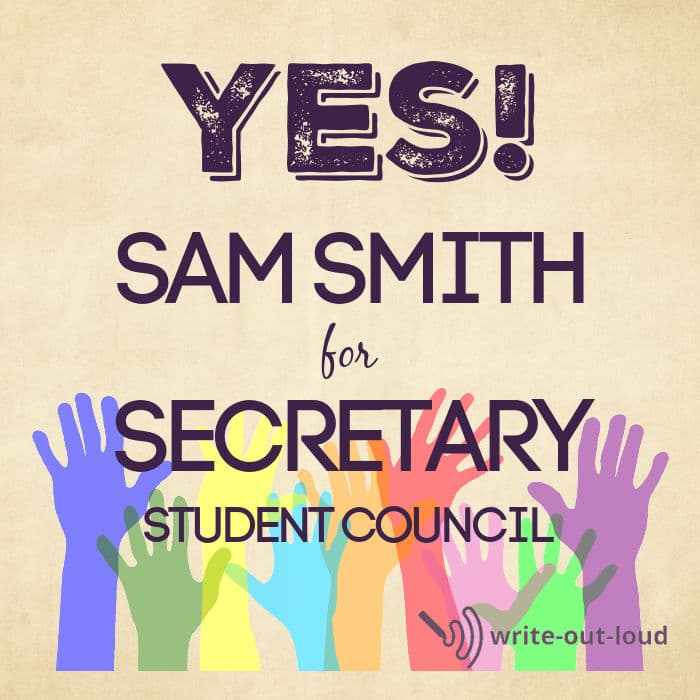
Don't you just love writing up notes, and scheduling activities? No? { said with a big smile ☺}
Fellow students, teachers, and staff of Cherry Landing College, fortunately I do!
That's why I'm here standing in front of you today. My name is Sam Smith, and I would sincerely appreciate the opportunity to serve you as your Student Council Secretary.
Excellent communication and organizational skills are essential for this role. As anybody who knows me knows, I have both of those, along with the determination to use them to benefit all of us.
The success of a Student Council is to a large extent determined by the efficiency and effectiveness of its communications. As your Secretary, I will make it my primary mission to ensure that information flows smoothly between the student body, teachers, and administration.
We know what happens when it doesn't flow as it should. And we don't like it. People feel excluded. Assumptions are made. Things quickly become unnecessarily chaotic - something we want to avoid!
Now, excellence in communication is underpinned by excellence in organizational skills. The first is impossible without the latter.
Again, I am known for my attention to detail and my ability to keep things well and thoroughly organized. From recording meeting minutes to maintaining a comprehensive calendar of events, you can rely on me to work diligently to keep our council running efficiently - a chaos free zone.
However, being Secretary isn't just about fulfilling administrative tasks well. It's about being a dedicated advocate for all of you. I promise to represent your interests and work to address any issues or challenges that may arise during the school year.
Whether it's improving the school facilities, advocating for more extracurricular activities, or addressing concerns about the cafeteria menu, I will be your voice.
Whoever you are, I promise to actively listen to your concerns, suggestions, and ideas, and to ensure that they are brought to the attention of the council.
In addition, I am fully committed to fostering a culture of inclusivity and collaboration within our school. I will actively seek out opportunities to bring students from different backgrounds and interests together. By doing so, together we will create a stronger, more united student body - a microcosm of the society we want to live in - one that supports us all.
In conclusion, I am ready and eager to serve as your Secretary. I bring a passion for communication, organization, and advocacy to this role. But most importantly, I bring a resolve to represent each and every one of you to the best of my ability.
Together, we can make our school a place where every student's voice is heard, and where positive change is always possible.
I ask for your support and your vote. Sam Smith for Secretary! Together, we can make a difference. Thank you.
Get a blank Student Council speech planner
Click on the image below to open a downloadable printable student council speech planner and outline pdf. (Please note it will open in a new window.)
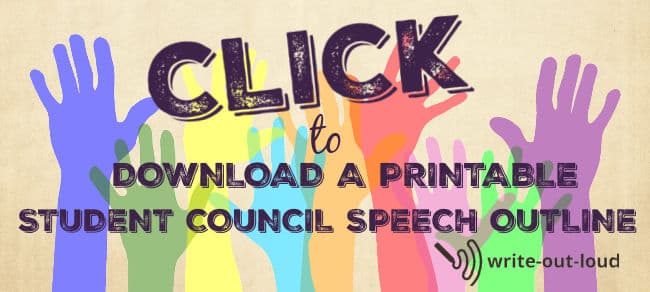
More resources for Student Council Speeches
If you've arrived on this page without seeing this one: Student Council Speeches , I highly recommend reading it before planning or writing your speech for Student Council Secretary.
You'll find:
- a list of important points you'll want to consider carefully before you start,
- another 2 example speeches - Student Council President and Student Council Vice President,
- tips for rehearsal or practice, and more.
Go to Student Council Speeches .
And click this link if you'd like to read an example Student Council speech for Treasurer .
speaking out loud
Subscribe for FREE weekly alerts about what's new For more see speaking out loud

Top 10 popular pages
- Welcome speech
- Demonstration speech topics
- Impromptu speech topic cards
- Thank you quotes
- Impromptu public speaking topics
- Farewell speeches
- Phrases for welcome speeches
- Student council speeches
- Free sample eulogies
From fear to fun in 28 ways
A complete one stop resource to scuttle fear in the best of all possible ways - with laughter.

Useful pages
- Search this site
- About me & Contact
- Free e-course
- Privacy policy
©Copyright 2006-24 www.write-out-loud.com
Designed and built by Clickstream Designs

Student Council Speech
Student council speech generator.
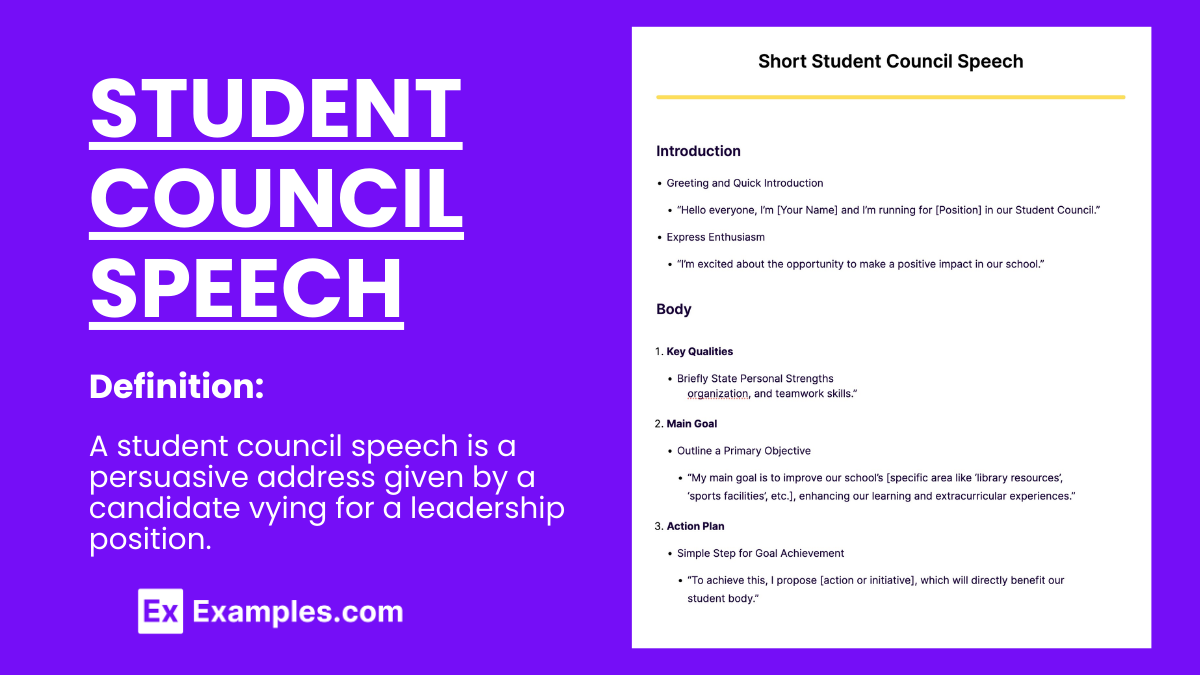
So you feel that you have what it takes to be part of your student council in your school. You got the guts, responsibility, wit, and charm to grab the position you are vying for from other students who are as qualified as you. Even if you are sure of yourself, you need to convince every student in your school that will be an effective officer if you are elected. And one way to convince your fellow students to vote for you is through your speech .
What is Student Council Speech? A student council speech is a presentation given by a student who is running for a position on the student council, which is a group that represents the interests and ideas of the student body at a school. In this speech, the candidate shares their ideas, goals, and plans to improve the school and address student concerns. They aim to persuade their classmates to vote for them by highlighting their leadership qualities, past achievements, and specific proposals for making positive changes within the school community. This speech is an important opportunity for candidates to connect with their peers and show why they are the best choice for the position.
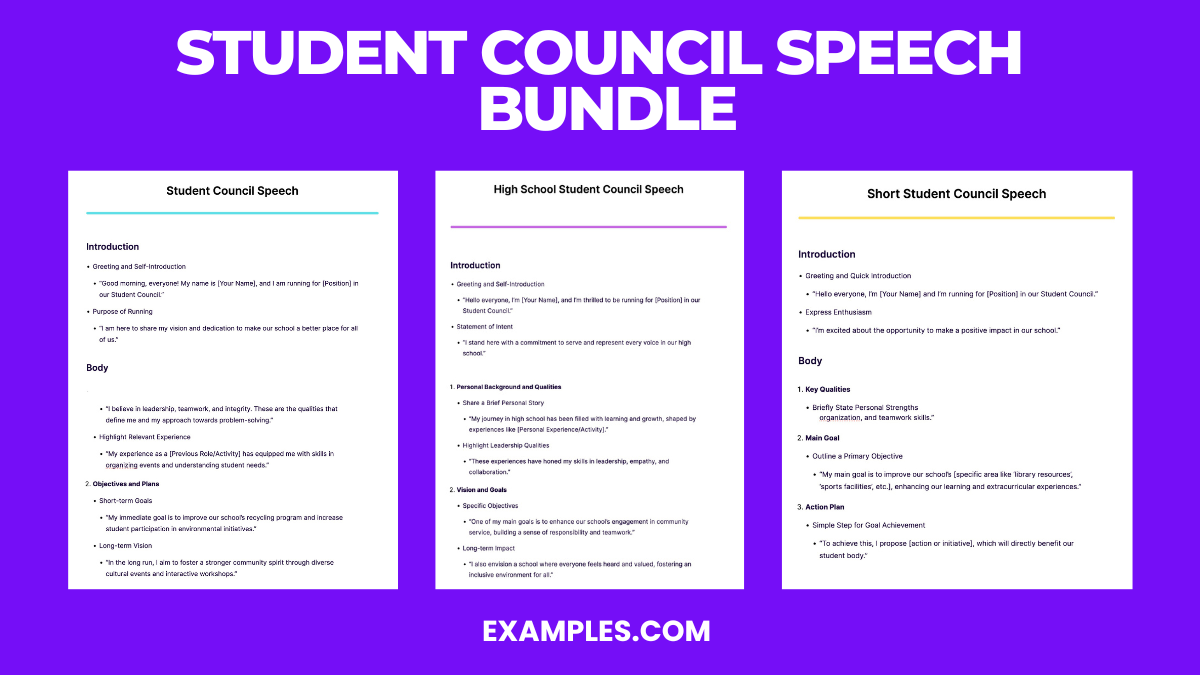
Download Sample Student Council Speech Bundle
When writing a student council speech, you must be able to persuade your schoolmates to trust in your abilities and your platforms. (If you need more tips on writing persuasive speeches , see this one). Remember, you are not running just for popularity votes or to earn yourself a good credential in your achievements. You are running for a certain position (whether you’ll be a president, treasurer, secretary, etc.) to serve the student body, to represent them when they want their needs to be attended to and to make better changes in your school. So first you need to make your speech sound persuasive, but not aggressive. Start writing your speech weeks ahead before you deliver your speech.

Student Council Speech Format
Introduction.
Greet the Audience: Start with a friendly greeting to capture the audience’s attention. Introduce Yourself: Briefly introduce yourself, including your name, grade, and any relevant personal background that relates to the position you’re running for.
Statement of Intent
Declare Your Candidacy: Clearly state the position you are running for on the Student Council. Motivation: Share why you decided to run for the student council, focusing on what motivates you and why the role is important to you.
Qualifications
Experience and Skills: Highlight your relevant experiences, skills, and achievements that make you a suitable candidate. This could include previous leadership roles, involvement in school activities, or specific talents that contribute to your ability to serve effectively.
Vision and Goals
Key Issues: Identify key issues or areas for improvement within the school that you plan to address. Proposed Initiatives: Outline your main goals or initiatives that you aim to implement if elected. Be specific about what changes or improvements you want to make and how you plan to achieve them.
Plan of Action
Strategies: Briefly describe the strategies or steps you will take to achieve your goals. This shows that you have thought about how to turn your ideas into action. Collaboration: Emphasize the importance of working together with fellow council members, students, and school staff to accomplish shared objectives.
Reiterate Key Points: Summarize the main reasons why you are the best candidate for the position, focusing on your vision, qualifications, and what sets you apart from other candidates. Call to Action: Encourage your classmates to vote for you, emphasizing the importance of their vote in making a positive change within the school. Thank You: Conclude by thanking the audience for their time and consideration.
Example of Student Council Speech
“Good morning, students and teachers of Springfield High! My name is Jamie Lee, a sophomore, and I’m excited to run for the position of Secretary on our Student Council. Why am I standing here today? Because I believe in change, in improvement, and most importantly, in us—as a student body—to make Springfield High not just a school, but a community where every voice is heard and valued. My experience as class representative last year taught me the importance of organization, communication, and dedication—qualities essential for the role of Secretary. My main goal is to enhance our school’s spirit and involvement through better-organized events, clearer communication between the student council and the student body, and by creating more opportunities for everyone to contribute their ideas and talents. I plan to introduce a monthly feedback session where you can share your thoughts and suggestions directly with the council. But that’s not all. I want to work on making our school events, including dances, fundraisers, and spirit weeks, more memorable and inclusive. How? By working closely with clubs and sports teams to ensure our activities reflect the diverse interests and talents within our school. I’m asking for your vote not just for me, but for the vision of a school where every student feels connected, involved, and proud to be a Springfield Hawk. Let’s make this year one of unity, fun, and achievement. Together, we can make a difference. Thank you for considering me as your next Student Council Secretary. Let’s soar high, Hawks!” This example of a student council speech uses a structured approach to convey the candidate’s motivations, qualifications, goals, and plans in a clear and engaging manner, effectively persuading classmates to lend their support.
What is the Best Student Council Speech Example?
Title: Creating Unity, Inspiring Change Good morning, fellow students, teachers, and staff, I stand before you today not as a candidate, but as a passionate advocate for positive change in our school. My name is [Your Name], and I am committed to fostering a sense of unity and bringing about real, impactful change. Imagine a school where every student’s voice is heard, where diversity is celebrated, and where kindness and respect are the foundation of our interactions. This vision drives my candidacy. 1. Unity Through Diversity: I believe in celebrating our differences. Let’s embrace our diverse backgrounds, interests, and talents to create a rich tapestry that makes our school vibrant and unique. 2. Student-Led Initiatives: I propose student-led initiatives that reflect our passions. From cultural awareness events to environmental projects, let’s turn our ideas into actions that benefit our entire community. 3. Mental Health Support: Mental health is a priority. I will work to expand counseling services, create safe spaces for open discussions, and promote stress-relief activities, ensuring every student’s well-being. 4. Interactive Learning: Let’s enhance our learning experience through interactive methods. I will advocate for technology integration, peer-to-peer tutoring, and hands-on projects that make education engaging and enjoyable. 5. Community Engagement: Our school is not just a building; it’s a part of our community. I will initiate partnerships with local organizations, organizing volunteer opportunities and outreach programs to give back and make a difference. In closing, I am not just asking for your votes; I am asking for your trust. Together, let’s build a school where every student feels valued, heard, and supported. Join me in creating a future where unity inspires change. Thank you.
Examples of Speeches for Student Council Representative?
Empowering student voices.
“Hello, everyone, I’m [Your Name], and I’m here to talk about empowering student voices. Our school is not just a place of learning; it’s a community, and in a community, everyone’s voice should be heard. As your student council representative, my mission is to bridge the gap between the student body and the administration. I will establish regular open forums where students can voice their concerns, ideas, and suggestions. These forums will be a platform for change, where we can work together to make our school an even better place. I’ll also implement an online suggestion box for those who may not be comfortable speaking up in person. Every idea counts, and every voice matters. Let’s make our school a place where students play an active role in shaping their own education. I promise to be your dedicated advocate, listening, acting, and ensuring that every student’s voice is heard. Vote for change. Vote for me. Thank you.”
Bridging the Gap
“Dear friends and fellow students, I’m [Your Name], and I’m running to bridge the gap between students and the administration. It’s time to foster a closer relationship that benefits us all. I propose regular meetings with teachers, administrators, and students to discuss school policies and improvements. Our education should be a collaborative effort, with students having a say in decisions that affect us directly. In addition, I’ll work to create an inclusive school culture. Let’s celebrate our diversity through cultural events, and ensure that every student feels welcome and valued. I believe in transparency and open communication. Together, we can make our school experience better for everyone. Vote for a bridge to a brighter future. Vote for me. Thank you.”
Building a Greener School
“Hello, fellow students, Our environment is a priority, and I’m committed to making our school more eco-friendly. As your representative, I’ll initiate ‘Green School’ initiatives. We’ll start with recycling programs and energy-saving projects. I’ll work to establish a school garden, promoting sustainable practices. Let’s reduce waste and show that we care about the future. Your voice matters. Tell me your eco-friendly ideas, and together, we can create a greener, healthier school. Vote for a greener future. Vote for me. Thank you.”
Student Council Speech Samples to Edit & Download
- Student Council Speech for Secretary
- Student Council Speech for 4th Grade
- Student Council Speech for Elementary
- Student Council Speech for 5th Grade
- Student Council Speech for Class Representative
- Student Council Speech for House Captain
- Student Council Speech for 3rd Grade
- Student Council Speech for Treasurer
- Student Council Speech for Vice President
- Student Council Speech for Election
Student Council Speech Examples & Templates
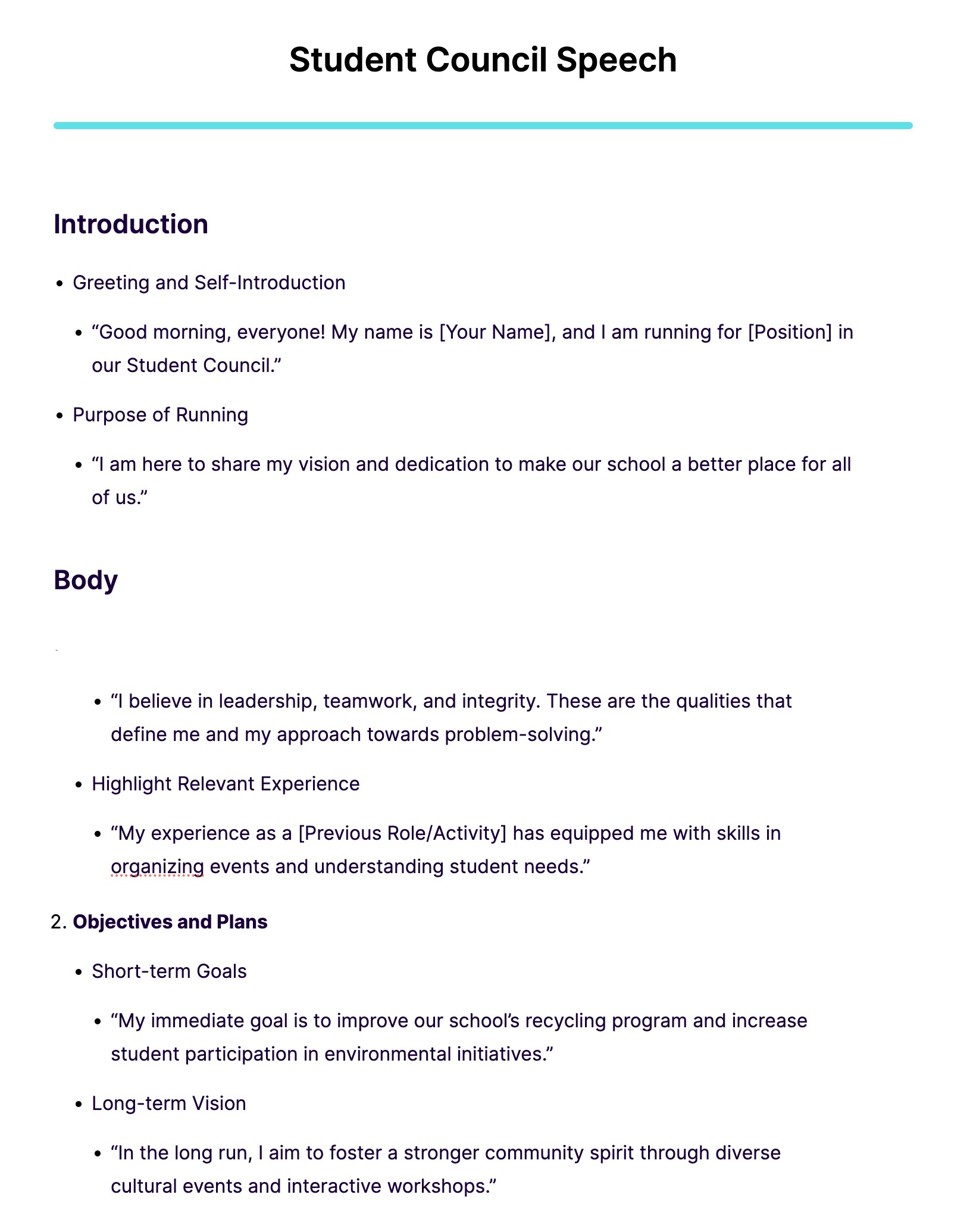
Free PDF Download
Funny Student Council Speech
High school student council speech.
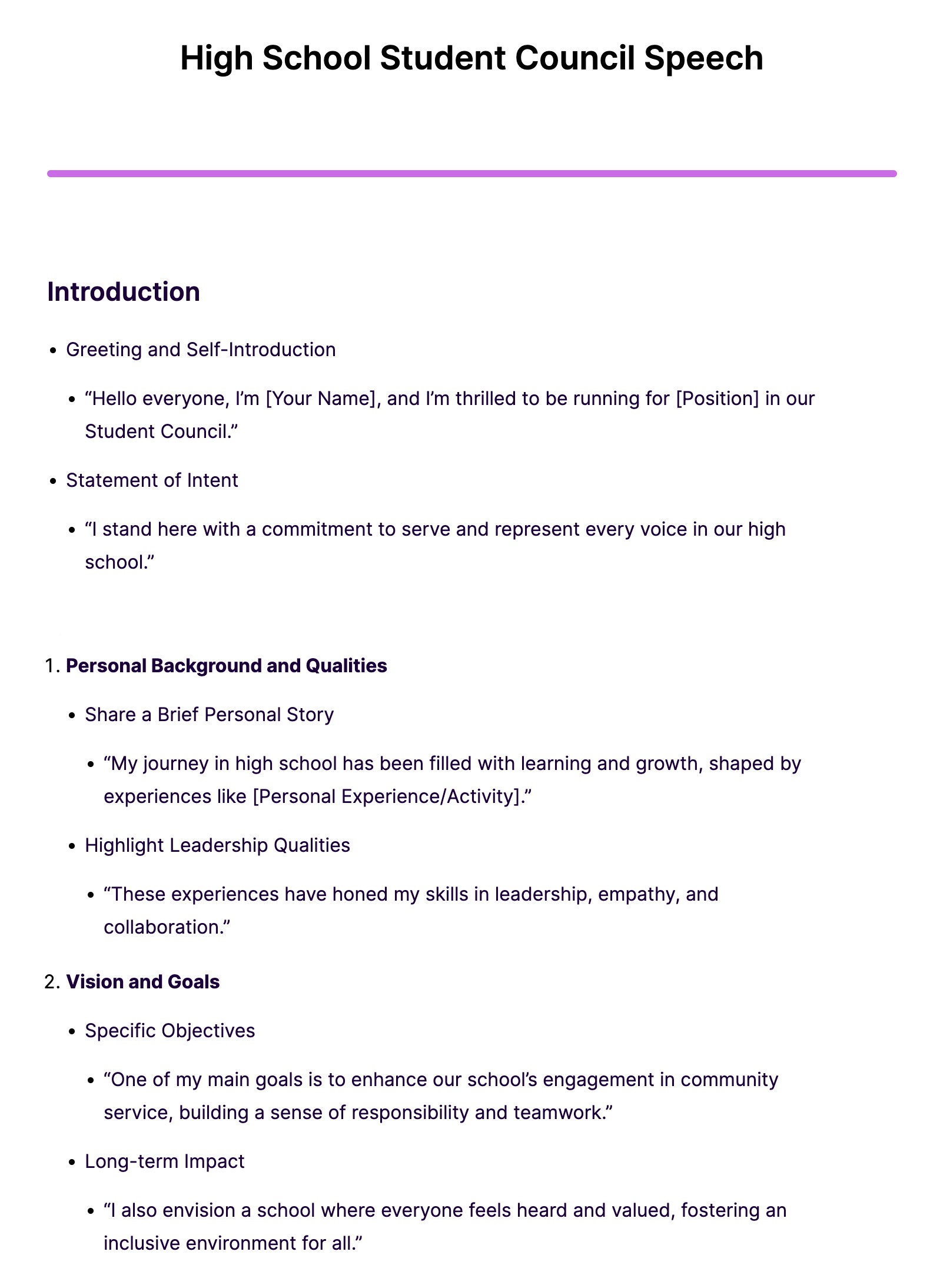
Edit & Download
Short Student Council Speech
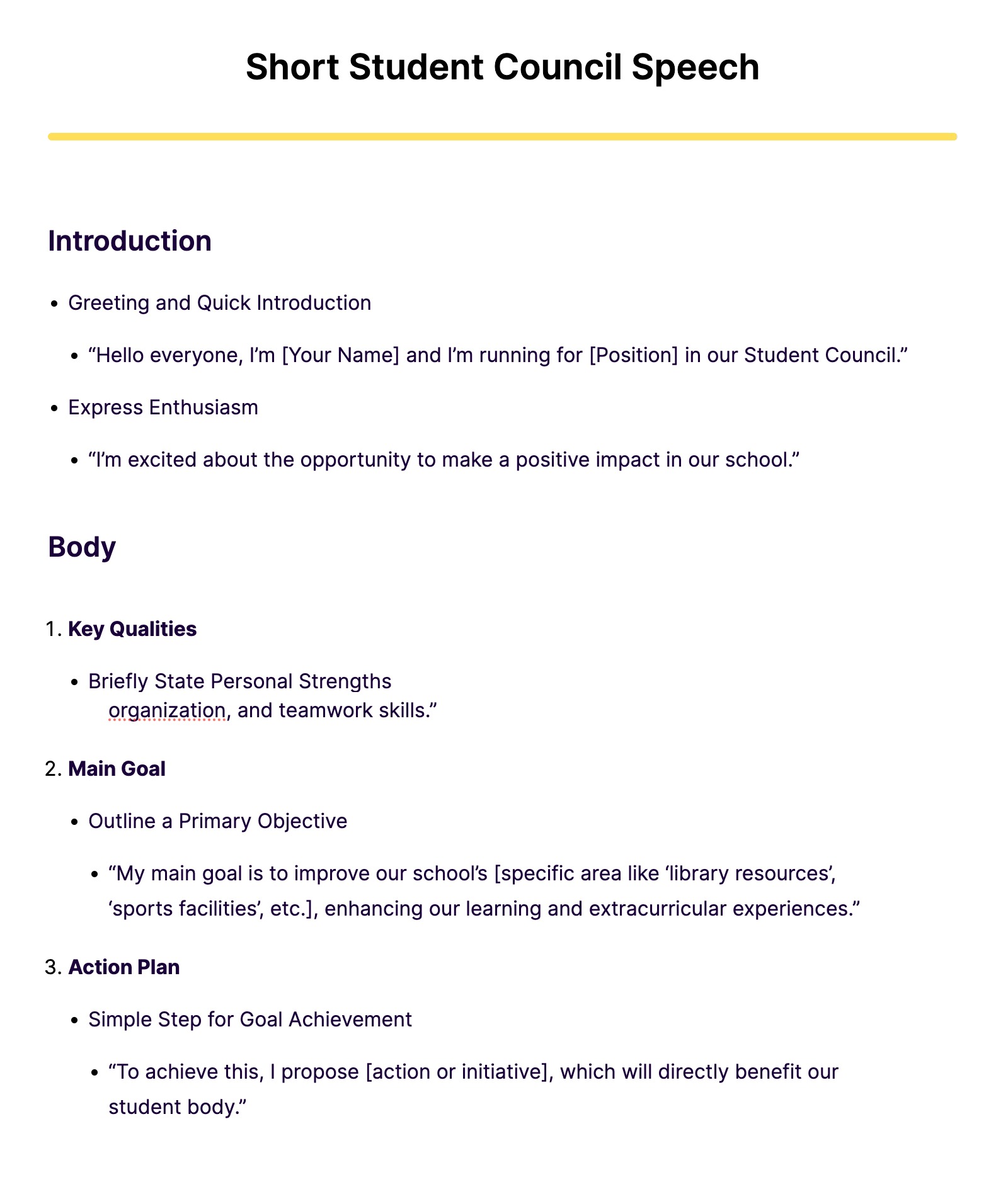
Short Student Council Secretary Speech
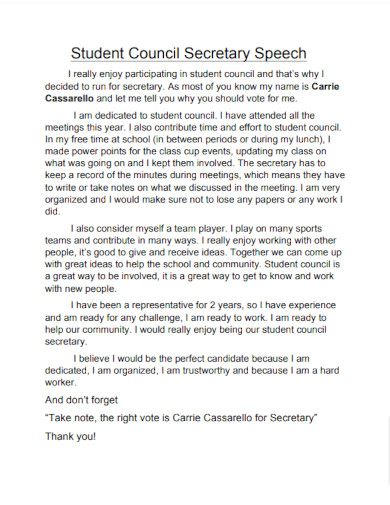
seaford.k12.ny.us
Sample Student Council Speech Guidelines and Schedule
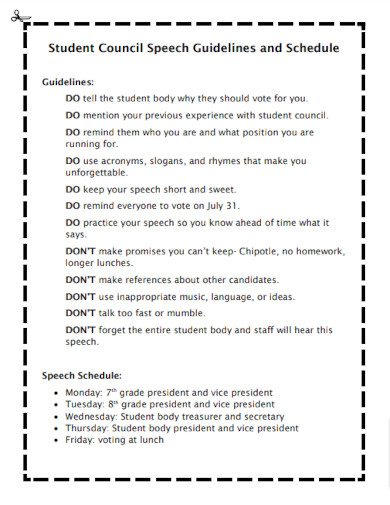
Speech Example for Student Council
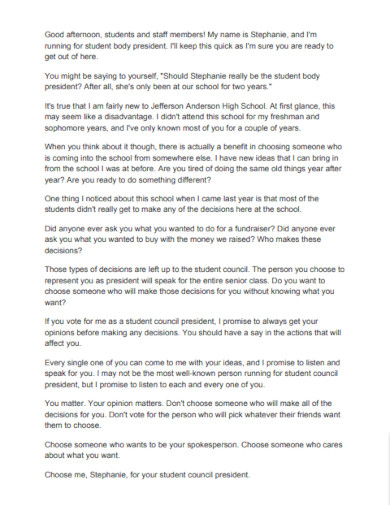
myperfectwords.com
Student Council President Speech
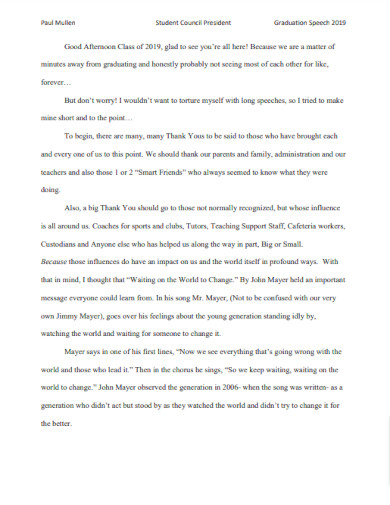
Junior Class President Speech
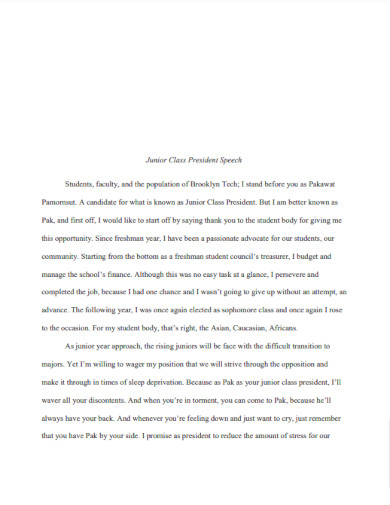
Student Council Campaign and Speech
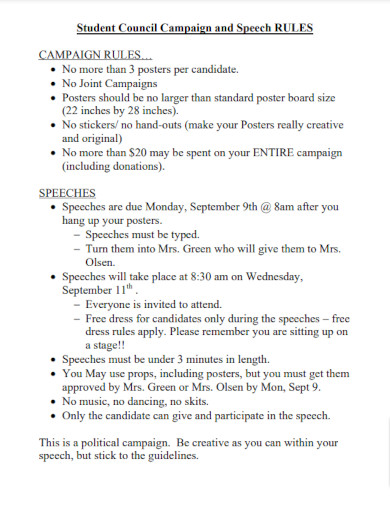
stignatiussacschool.org
High School Student Council Speech
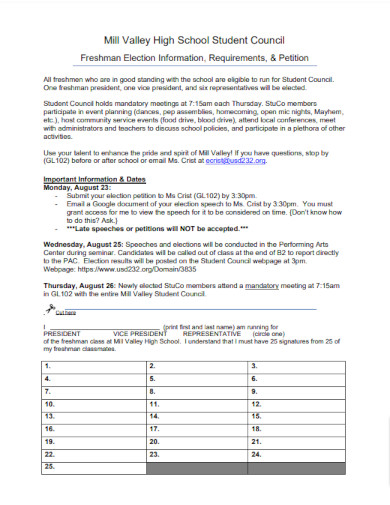
How to Write Student Council Speech
This is the most nerve-wracking part of your speech. So this part must be a good, no, great one. If for examples. you’re running for student council president don’t start just by merely introducing your name and telling them you are running for student council. You need to start your speech with a bang! Something that can catch the attention of your audience. Students are usually inattentive during these kinds of speeches so you need them to focus towards you. There are lots of creative ways to make a flashy opening. You can sing, rap, dance, act, do some comedy sketches, or anything that relates to the theme of your speech. However if you do not feel like performing live, you can still do some creative opening. You can use videos, power point presentation, music, or ask your friends to introduce you. You may also see introduction speech .
You can also open your speech by asking a question, whether if it is rhetorical or humorous. Here are some examples:
“So here is this person standing infront of you, asking you to for her. Why should you? You ask.” “If there’s anything you can do something for the school to make it loads better, what will it be?”
You can also add quotes from famous people that correlates with your speech. Make sure you cite your quotes properly. Here are some examples of quotes from well known people that you can cite:
“Leadership is not about the next election. It’s about the next generation.” Simon Sinek “I think leadership is service and there is power in that giving: to help people, to inspire, and motivate them to reach their fullest potential.” Denise Morrison “You need an attitude of service. You’re not just serving yourself. You’re helping others to grow up and grow with them.” David Green
After your awesome introduction, you then proceed to state all about yourself. Describe yourself, the position you are running for and the reason why you are running. Tell your name and your grade in your school. This is important if you go to a school with a big population. Don’t ever skip this part of speech as this will be what the audience should remember when it’s time to vote for you. You may also see thank you speech .
No need to elaborate in this part of speech. A brief 1-2 sentences are enough. Example:
“Hello. My name is John Cheese and I will be running for President! My vision is change for the betterment of our school. I fight for equality for all the students in this institution.”
Next is the part where you will sell yourself by mentioning your qualifications. This is one way to persuade your fellow students that you are responsible enough to be part of the student council. Mention any accomplishments that are related to the position your are running for.
If you’re running for president, don’t list your accomplishments in stamp collecting. The accomplishments that you should cite are your leadership skills, whether you are the team captain of your football team or you’re the major in your drum and lyre corp. You can also mention your honors and awards. You may also see speech templates .
“I am currently the team captain of our baseball team and I have also been a member of the Boy Scouts. Currently, I am the president of our drama club. I have also been an honor roll student for the past five years. I have been exposed to a lot of leadership training skills and I believe I am most qualified to be an efficient president in the student council.”

Writing the main point of your speech
Now that you have organize your introduction, it’s time to get to your ideas and how you should present them in front of the student body. This is the part where you will enumerate your platforms on how to improve the system in your school. Make sure that when you have laid out your platforms to the students you made some research. Ask the students, teachers, personnel on what areas that you should be improved.
Listen to what the students are concerned about. What are the changes that the students may want to see? What areas in your school you want to change to keep it running efficiently? You can also research ways on how to deal with school problems. Read books and ask some experts to help you. And find out how you, a member of the student council can address these problems. Once you already knew this, you will know what will be your platforms. A nice opening statement is to state out the causes that are important to you and what are your plans to make it better. You may also see special occasion speech .
“Bullying and discrimination has been more prevalent in this institution for the past year. As a student, I am disappointed that some of my fellow schoolmates has been the forerunners of this ugly way of treating people. And because of this, I would work out to invite speakers to talk about sensitivity in school, open more clubs for students to join, and start a tutorial program to aid students who are having a hard time in their classes.”
Keep in mind that you need to present your ideas briefly but persuasive enough to move your audience. If you need an inspiration, refer to Abraham Lincoln’s Gettysburg Address. His speech was short but full of key points that got his message across to his audience. You may also see self introduction speech .

End it with a memorable conclusion
1. Once you’ve stated your ideas effectively, it’s time for your conclusion. When you get there, go back to mention your plans as a president or a treasurer and relate it to your main points that you’ve mentioned a while ago. You may also see speech examples for students .
“With my experience in leadership training and in my service to my team members, I know I can be a great leader to each of you. I promise to do my best to stop discrimination and bullying and to increase the interest of the students to be more open to each other’s diversities.”
2. Don’t forget to highlight your qualifications one last time. They key to this is to sincerely state that it is your passion to serve your students. You may also see tribute speech .
“I am a passionate advocate against discrimination. And to change that attitude starts here in our school. I want everyone to be accepting of everyone’s differences. I vision an institution with good relations between students and faculty members. I care about each of you and your right to be treated fairly…”
3. Of course, don’t forget to ask the audience to vote for you. Here is the part where you will beg your students to vote for you. Their vote is important for you to win the election. Ask with genuine humility for the students to vote for you. You may also see informative speech .
“I ask nothing but your votes. I would be deeply honored if you’ll vote for me on the election day.”
Now that you completed your speech, see to it if it’s good enough for you to use. Ask a friend, a family member, or a teacher to read your speech. Ask them what areas you need to improve. Ask for a constructive criticism, even if it hurts.
It’s important for you to learn to improve your speech and to be open-minded towards critical suggestions. Remember you are running for the student council. Make yourself a best example of a responsible student that your fellow students can look up to. Additionally, debates may come up in before the election day, so make yourself familiarize with debate speeches .
What is a good speech for student council?
A good speech for a student council should be engaging, relatable, and persuasive. It should include:
- Introduction: Begin with a strong hook or personal anecdote to grab the audience’s attention.
- Your Vision: Clearly outline your goals and vision for the student council. Explain how you intend to make positive changes.
- Relevance: Address the specific needs and concerns of your fellow students. Show that you understand their issues and are committed to addressing them.
- Qualifications: Highlight your relevant skills, experience, and qualities that make you a suitable candidate.
- Ideas and Initiatives: Present concrete ideas and initiatives you plan to implement if elected. Be specific and practical in your proposals.
- Inspiration: Motivate your audience with an inspiring message that encourages unity and active participation.
- Closing: End with a strong call to action and a memorable closing statement.
Why do I want to run for student council?
- Leadership: Desire to take on a leadership role and make a positive impact on your school community.
- Advocacy: A commitment to representing and addressing the concerns and needs of fellow students.
- Service: A genuine interest in serving others and contributing to the betterment of your school.
- Initiative: Eagerness to implement positive changes, initiatives, and projects that benefit the student body.
- Voice: A belief in the importance of having a voice in the decision-making processes at your school.
- Personal Growth: Opportunity for personal growth, development of leadership skills, and networking.
- Passion: Passion for specific causes, clubs, or activities at your school and a desire to support them.
- Community Building: A goal to create a sense of community, unity, and school spirit among students.
- Inspiration: Being inspired by previous student council members or leaders who made a positive impact.
- Love for Your School: A deep affection for your school and a desire to contribute to its success and well-being.
What are the Good student council speech ideas?
- Mental Health Awareness: Discuss initiatives to promote mental health and well-being, such as counseling services, stress-reduction activities, or peer support programs.
- Diversity and Inclusion: Address the importance of diversity and inclusion, proposing events, clubs, or awareness campaigns to celebrate differences and foster unity.
- Student Engagement: Highlight the need for more student involvement in decision-making, suggesting forums, surveys, or open discussions for students to voice their concerns.
- Environmental Sustainability: Propose eco-friendly practices, like recycling programs, tree planting, or energy conservation efforts, to make your school more sustainable.
- Bullying Prevention: Talk about strategies to combat bullying and promote kindness and respect within the school community.
- Academic Support: Suggest peer tutoring programs, study groups, or additional resources to help students excel academically.
- Extracurricular Activities: Promote the creation of new clubs, sports, or arts programs to cater to a wider range of interests.
- Community Outreach: Encourage volunteer opportunities, partnerships with local organizations, and community service projects.
- School Safety: Address safety concerns and suggest measures to ensure a safe and welcoming school environment.
- Technology Integration: Propose the use of technology for educational enhancement, including virtual resources and tools for remote learning.
- Student Wellness: Advocate for initiatives like healthy eating options, exercise facilities, or mindfulness practices to support student well-being.
- Peer Mentorship: Discuss the benefits of mentorship programs, where older students can guide and support younger ones.
What are the Topics Included for Student Council Speech?
Student council speeches can cover a wide range of topics, depending on the issues that matter most to your school and peers. Here are some common topics and themes to consider:
- Leadership and Service: Discuss your commitment to serving and leading your fellow students.
- Unity and Inclusivity: Emphasize the importance of fostering an inclusive and welcoming school community.
- Student Voice: Highlight the need for students to have a say in school decisions and policies.
- Academic Excellence: Talk about ways to improve academic support, resources, and educational opportunities.
- Mental Health and Well-being: Address the importance of mental health support and stress reduction.
- Diversity and Cultural Awareness: Celebrate diversity and promote cultural awareness and understanding.
- Environmental Initiatives: Propose eco-friendly projects and sustainability efforts for the school.
- Bullying Prevention: Discuss strategies to combat bullying and create a safer, kinder school environment.
- Community Outreach: Advocate for volunteer opportunities and partnerships with local organizations.
- Technology Integration: Propose using technology for educational enhancement and virtual resources.
- School Safety: Address safety concerns and suggest measures to ensure a safe school environment.
- Peer Mentorship: Talk about the benefits of mentorship programs to support academic and personal growth.
- Student Well-being: Discuss initiatives like healthy eating options, exercise facilities, or mindfulness practices.
What are the Quotes to put in a student council speech?
- Be the change you wish to see in the world.” – Mahatma Gandhi
- “Leadership is not about being in charge. It is about taking care of those in your charge.” – Simon Sinek
- “The future belongs to those who believe in the beauty of their dreams.” – Eleanor Roosevelt
- “In diversity, there is beauty and strength.” – Maya Angelou
- “You are never too old to set another goal or to dream a new dream.” – C.S. Lewis
- “The only way to do great work is to love what you do.” – Steve Jobs
- “Leadership is not a position or a title; it is action and example.” – Cory Booker
- “Don’t watch the clock; do what it does. Keep going.” – Sam Levenson
- “We may encounter many defeats, but we must not be defeated.” – Maya Angelou
- “The best way to predict the future is to create it.” – Peter Drucker
- “Unity is strength… when there is teamwork and collaboration, wonderful things can be achieved.” – Mattie Stepanek
- “Success is not final, failure is not fatal: It is the courage to continue that counts.” – Winston Churchill
- “Education is the most powerful weapon which you can use to change the world.” – Nelson Mandela
- “Your time is limited, don’t waste it living someone else’s life.” – Steve Jobs
- “The best leaders are those most interested in surrounding themselves with assistants and associates smarter than they are.” – John C. Maxwell
How to start a student council speech?
Begin a student council speech with a compelling and attention-grabbing opening, like a quote, personal anecdote, or thought-provoking question, to engage and captivate your audience from the start.
What is the main idea of student council?
The main idea of a student council is to represent and serve the interests of the student body, fostering leadership, organizing events, and improving the school community.
How do I run a good student council?
To run a good student council, prioritize communication, listen to peers, set clear goals, organize effective events, and collaborate with the school administration to address students’ needs and concerns.
Text prompt
- Instructive
- Professional
Write a Student Council Speech on improving school lunches.
Create a Student Council Speech about enhancing school spirit.
Speech template
Use this template to write a 1-minute campaign speech to convince voters to vote for you.
My name is (name) and I represent (party name).
Our party believes that … (describe the issue)
This matters because … (give some reasons, using your research)
Our idea to improve our school is …
This will help by … (give one or two examples)
If elected, we will make sure that …
Vote for us and we will work hard to …
End with your campaign slogan, if you have one.
Acceptance speech
Thank you to everyone who supported me in this election and to all the other candidates for their great campaigns. I promise to work hard to create solutions to (your party’s issue) and to represent you and your ideas as the honourable member from (our class).
How to Write a Student Election Speech
Brandi laren, 25 jun 2018.

If you are a leader and aspire to inspire others, running for student government is an ideal choice. Even the process of entering an election will give you a first-hand lesson in leadership, voting, elections and politics. It doesn't matter if you are running for president, vice president or secretary of the student council, you will have to prepare a speech and present it to your classmates. This speech, along with other campaigning tactics, like putting up posters, can make a big difference.
Explore this article
- Introduction
- Main Points
1 Introduction
Start your speech by welcoming your classmates and thanking them for attending. Then, introduce yourself, describe what office you're running for and quickly state why you're the best candidate. For example, "Good morning, everyone. My name is John Smith and I'm running for president of the student council. As students, we are ready for change in our school. I am the person who can help. As president of student council, I would fight for better school lunches, more after-school activities and more field trips." Talk briefly about some of your other leadership positions at school and why they have prepared you for the position. Use your personality to draw in your classmates and ignite their interest in learning more about you.
2 Main Points
Focus on the student body's interests. What are some things that students have been requesting at your school? What have they been complaining about? If you could improve five things about your school, what would they be? Use these elements in your speech. Let them know that you've been paying attention. For example, "We are tired of bad school lunches. As president of the student council, I will fight to get us better meals." Try not to make false promises. Talk about school supplies and events and other things that you are more likely to have control over. State these things briefly in your speech. If you have a catchy slogan you've been using on your posters around the school, don't forget to use that, throughout your speech.
Conclude by letting your classmates know that if you are elected, you'll be working for them. Tell them that you'll always be open to their ideas on how the school can be improved and be more fun and enjoyable. Your campaign speech should only be about one to two minutes long, so make sure you keep your points short and meaningful. Think of a creative ending that will serve as a punctuation mark and leave your classmates wanting more.
- 1 Benedictine University: How to Write a Meaningful Manifesto
- 2 Forbes: 10 Keys to Writing a Speech
Related Articles

How to Write a Speech for Running for Student Council...

How to Write a Class Vice President's Speech

How to Run for Student Council in the Fourth Grade

How to Write a Speech for Class Secretary

How to Write a Middle School Election Speech

How to Write a Class President Speech

How to Write a Class Officer Speech

How to Write a Speech for a 7th-Grade Class President

High School Campaign Slogan Ideas

How to Write a Short Speech for a Junior High Student...

How to Write a Student Body President Speech

How to Write a Speech for the Fourth Grade Student...

Ideas for Getting Votes for Student Council

How to Run for Class President in the 3rd Grade

How to Write an Essay About Your School & Career Goals

Good Speech Topics for Grade 8 Students

Goals & Objectives for the First Day of School

Theme Ideas for Pep Rallies

Ideas for a Fifth-Grade Class President

How to Do a Welcome Speech for the Church
Regardless of how old we are, we never stop learning. Classroom is the educational resource for people of all ages. Whether you’re studying times tables or applying to college, Classroom has the answers.
- Accessibility
- Terms of Use
- Privacy Policy
- Copyright Policy
- Manage Preferences
© 2020 Leaf Group Ltd. / Leaf Group Media, All Rights Reserved. Based on the Word Net lexical database for the English Language. See disclaimer .

COMMENTS
Commentary: This short speech is ideal for a campaign rally or event introduction. It emphasizes unity, shared purpose, and the power of collective action to create positive change. The speaker presents themselves as a champion of the people, ready to fight for their rights and well-being. ... These six inspirational election speech examples ...
Step 3: Craft Your Message. Crafting a powerful message involves choosing the right words and verbs that capture your vision succinctly. Keep your sentences simple and avoid jargon that might alienate your listeners. Weave in relevant examples and personal anecdotes to establish a connection and make your speech relatable.
Greeting: Start with a warm greeting to the audience. Self-Introduction: Introduce yourself and your candidacy. Purpose: State the purpose of your speech. Example: "Good evening, everyone. My name is [Your Name], and I am running for [Position]. I am here to share my vision for our community and ask for your support.".
10 Student Council Speech Samples. Randy Rothgarn December 25, 2023 Speeches. Running for a position on the Student Council is a commendable endeavor that requires courage, planning, and a clear vision. Student Council serves as the voice of the student body, advocating for changes, planning events, and representing student interests.
When writing a campaign speech, it's important to address three pieces: the introduction, or beginning; the pillars of the speech, or foundational ideas; and delivery. This will steer your speech ...
Stump Speech: Connect With Voters by Creating a Campaign Speech. Here is our ultimate guide to writing a great stump speech. We all know that the candidate is the campaign's best asset, and the stump speech is the best campaign tool for delivering a 7C's (clear, concise, contrastive, connective, creative, compelling, consistent) message and personal story about the candidate and campaign.
Ethos, Pathos, and Logos. As put forth in Aristotle's Rhetoric, 2300 years ago, the answer to how to write a political speech may be directly traced back to these three elements: Ethos - The credibility of the speaker as perceived by the audience. Pathos - The emotional connections you make with the audience.
Your speech needs a clear beginning, middle, and end. The beginning needs to hook the audience, you need to keep them interested through the middle, and the end should leave them nodding their heads in agreement, applauding and on their feet. 2. Stay on message. Don't let your speech wander and meander.
Writing the Introduction. Find an attention-grabbing opening statement. To begin your speech for student council president, you need to begin with a strong, attention grabbing opening. You'll likely be giving this speech during school hours, so your classmates' attention spans might be a bit strained. Do not merely start by saying, "My name is ...
Step 2: Craft a powerful opening. The opening of your speech is crucial, as it sets the tone and captures the attention of your audience. Start with a strong and compelling statement that immediately grabs their attention. You could use a statistic, a quote, or a personal story to draw them in and make them want to listen to what you have to say.
Crafting a compelling political speech holds immense importance for any aspiring politician and successful political campaign. It is a powerful tool for connecting with the audience, influencing opinions, and igniting action. To make speeches truly impactful, harnessing the power of voter engagement and direct sourcing is key.
Stump Speech Examples That Define Candidates. These nine stump speeches are notable for their ability to connect with audiences, convey a powerful message, and leave a lasting impact on listeners: Barack Obama's 2008 "Yes We Can" speech as presidential candidate became iconic, inspiring hope and calling for change.
1. Begin your speech by introducing yourself and your message. Within the first handful of seconds, you want everyone listening to know who you are, what you're running for, and why. Give 1-2 details about why you're the right person for the position, and find a way to organically plant your slogan early on.
Self-Introduction Speech Examples & Tips to Help You Be Confident & Calm ; ... Secretary Election Speech Sample. Today, I want to tell you something about me that you might not know. From the time I was five years old, I've been taking guitar lessons. I don't play in a band and I don't take music classes at school, but every night when I get ...
Create an introductory sentence based on the stage of the election, the campaign platform and the group of people you are addressing. Depending on where you are in the election process, your candidate may or may not have to introduce himself with his name and the fact that he's running for president. You may also need to make sure he lists ...
Sample Speeches. Sample High School President Speech ... Part 1. Part 1 of 3: Writing the Introduction. Download Article ... a couple of weeks before the election so you have time to have a few people look it over and give you advice. You should even give them a number-based answer from 1-5. Research what other student council speeches are like ...
By doing so, together we will create a stronger, more united student body - a microcosm of the society we want to live in - one that supports us all. In conclusion, I am ready and eager to serve as your Secretary. I bring a passion for communication, organization, and advocacy to this role.
Include your motivation and inspiration behind it. Detail your intent and how being part of the student council will help you achieve your personal goals and career goals. 3. Construct a Gripping Platform. The next part is to start writing your campaign speech. In writing the items for your platform, the most crucial method is to listen to your ...
Let's soar high, Hawks!". This example of a student council speech uses a structured approach to convey the candidate's motivations, qualifications, goals, and plans in a clear and engaging manner, effectively persuading classmates to lend their support. Free Download in Word Free Download in PDF.
If you are writing a school election speech, chances are that you are running for a student government position. You want to build a great speech with strong, persuasive arguments that influence others - and influence their vote, too. ... Read through this example speech for some inspiration. Hello, everyone! I'm Pat D. Candidate, and I want ...
Speech template. Use this template to write a 1-minute campaign speech to convince voters to vote for you. My name is (name) and I represent (party name). Our party believes that … (describe the issue) This matters because … (give some reasons, using your research) Our idea to improve our school is …. This will help by … (give one or ...
An election speech is an important part of a campaign for student government. Often delivered in a formal setting, you may also give an election speech in a classroom setting or cafeteria. ... 1 Introduction. Start your speech by welcoming your classmates and thanking them for attending. ... For example, "Good morning, everyone. My name is John ...
The best speeches from the campaign trail. Each party leader has picked their favourite speech. Read the full text here. In 35 days of campaigning across the country, the leaders have had ...